THE TALE OF ROSE companion piece
Table of contentsEach title is linked to relevant section (click on them to find them directly)
ANNEX : Profile of Lin Gengxin Excerpt about this drama (to view the Profile in full click on : PROFILE) Sources : MDL, Sohu, Baidu, Weibo, Wikipedia and other articles. (highlighted texts lead to sources ; pictures lead to their source or further information. To view the list of my other drama companion pieces (with links to them), check : HERE. |
This companion piece was completed on June 30, 2024, with minor additions (music, new Douban rating, number of weeks in top 10) on August 13, 2024.
1. General information |
Chinese title : 玫瑰的故事 (The Tale of Rose), 2024 TV series directed by Wāng Jùn 汪俊
Crew : Screenwriter: Lǐ Xiāo 李潇
- Stylist / Costume Designer : Ài Wén (Ivan Ai) 艾闻
- Production Designer: Wáng Jìng 王竞
- Cinematographer: Zhāng Wén Jié 张文杰
Main Cast
Officially, only the three first are "leads" ; the others are "guests" on Rosie's journey, and cast as such, even though these guests are very special and necessary for that rose's development, who refused to be uprooted casually and disrespected. The four guests are nonetheless more than unimportant passersby and each is a star who took his role seriously to bring a different bloom on that "rose story" .
Find hereunder the remuneration some of them got for their work
|
"The play is adapted from the novel Méiguī de gùshì (玫瑰的故事) , 'The Story of Rose', by Yì Shū 亦舒.
THE AUTHOR :
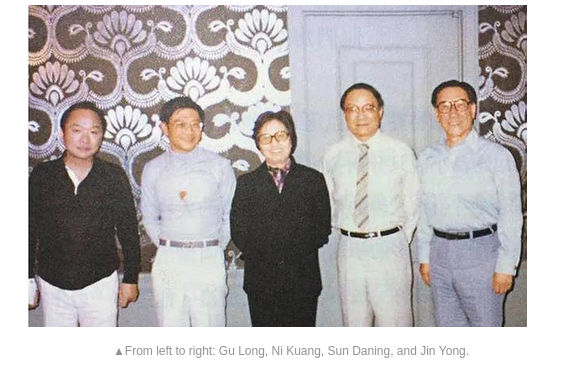 Isabel Ni / Ní Yì Shū 倪亦舒 is the younger sister of Hong Kong science fiction and wuxia novelwriter Ní Kuāng 倪匡. She was born on September 25, 1946 (age 77 years), in Shanghai. Under the influence of her brother Ni Kuang and his friends Jin Yong and Gu Long, Yi Shu began to try writing. She has been hailed as a rising talent of the times for her novels, short stories, prose essays and interviews. Her works such as "The First Half of My Life" (1982, unfaithfully adapted to drama) and "Golden Years" (2020) have been adapted into films and TV series and have become popular TV series. She also worked as a screenwriter and, under the pen name of Isabel, as a columnist at the Mingpao Weekly.
Isabel Ni / Ní Yì Shū 倪亦舒 is the younger sister of Hong Kong science fiction and wuxia novelwriter Ní Kuāng 倪匡. She was born on September 25, 1946 (age 77 years), in Shanghai. Under the influence of her brother Ni Kuang and his friends Jin Yong and Gu Long, Yi Shu began to try writing. She has been hailed as a rising talent of the times for her novels, short stories, prose essays and interviews. Her works such as "The First Half of My Life" (1982, unfaithfully adapted to drama) and "Golden Years" (2020) have been adapted into films and TV series and have become popular TV series. She also worked as a screenwriter and, under the pen name of Isabel, as a columnist at the Mingpao Weekly.
But despite being labeled as a "queen of romance", she had a rather chaotic life. She fell in love at the age of 17, got married at the age of 18, had a child at the age of 19, and divorced at the age of 20. She married 3 times and divorced twice before, in her 40s, marrying a Mr Liang met on a blind date (!) and giving birth to a daughter from artificial insemination. She traveled to Canada with 2nd husband Yue Hua and settled in Vancouver since, but since her last divorce and marriage, she cut off all ties to family to her brother, to her son of first marriage, and many former friends . In her book "Brave New World", Yi Shu expressed her own views on love: Life is short, and the most important thing is to satisfy yourself, not to please others.
THE NOVEL :
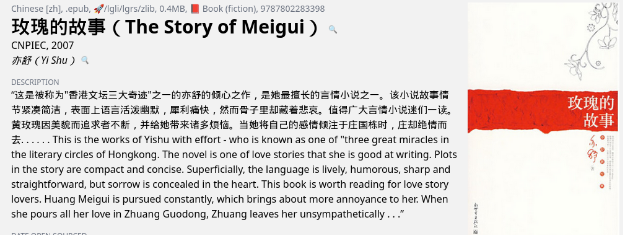 The story of Rose (2007) is based on the growth story and emotional journey of Huáng Yìméi (played by Liú Yìfēi) spanning more than 20 years. It examines in depth the emotional life of an urban woman. The whole play focuses on many social phenomena and topics, portraying the wonderful moments of contemporary women's bravery and blooming." (Baidu) Despite seeming losses and setbacks, it is a tale of resilience : "Huáng Yìméi is not depressed, she is always working hard to live a more exciting life."
The story of Rose (2007) is based on the growth story and emotional journey of Huáng Yìméi (played by Liú Yìfēi) spanning more than 20 years. It examines in depth the emotional life of an urban woman. The whole play focuses on many social phenomena and topics, portraying the wonderful moments of contemporary women's bravery and blooming." (Baidu) Despite seeming losses and setbacks, it is a tale of resilience : "Huáng Yìméi is not depressed, she is always working hard to live a more exciting life."
* Some online papers write Wallace Huo's character name as 溥家明 Pǔ Jiāmíng ; Baidu and others use 傅家明 Fù Jiāmíng - subtitles use this latter spelling in ep.29 when HZH and SuSu talk about him. Also notice that the main character in the novel is called Huang Meigui 黄玫瑰, whereas the corresponding main character in the drama is Huáng Yìméi 黄亦玫 (using the same character for "Yi" as the actress Liu Yifei 刘亦菲 .
2.. Shooting dates and locations, other production details.Airing, reservations, popularity ; Platforms to watch the series ; Promotion and buzz, Weekly popularity and Douban initial rating |
Locations : Beijing, Shanghai, Paris, Yanji (Yanbian Korean autonomous prefecture of Jilin province). There was a controversy about the crew using Renmin University (another prestigious top university in Haidian district of Beijing) disguised as Tsinghua because they did not get authorization to film in Tsinghua. Students complained on the web that "Rose Story" blocked roads for the filming of the campus drama, affecting the lives of teachers and students who still had some classes during the summer vacations.
 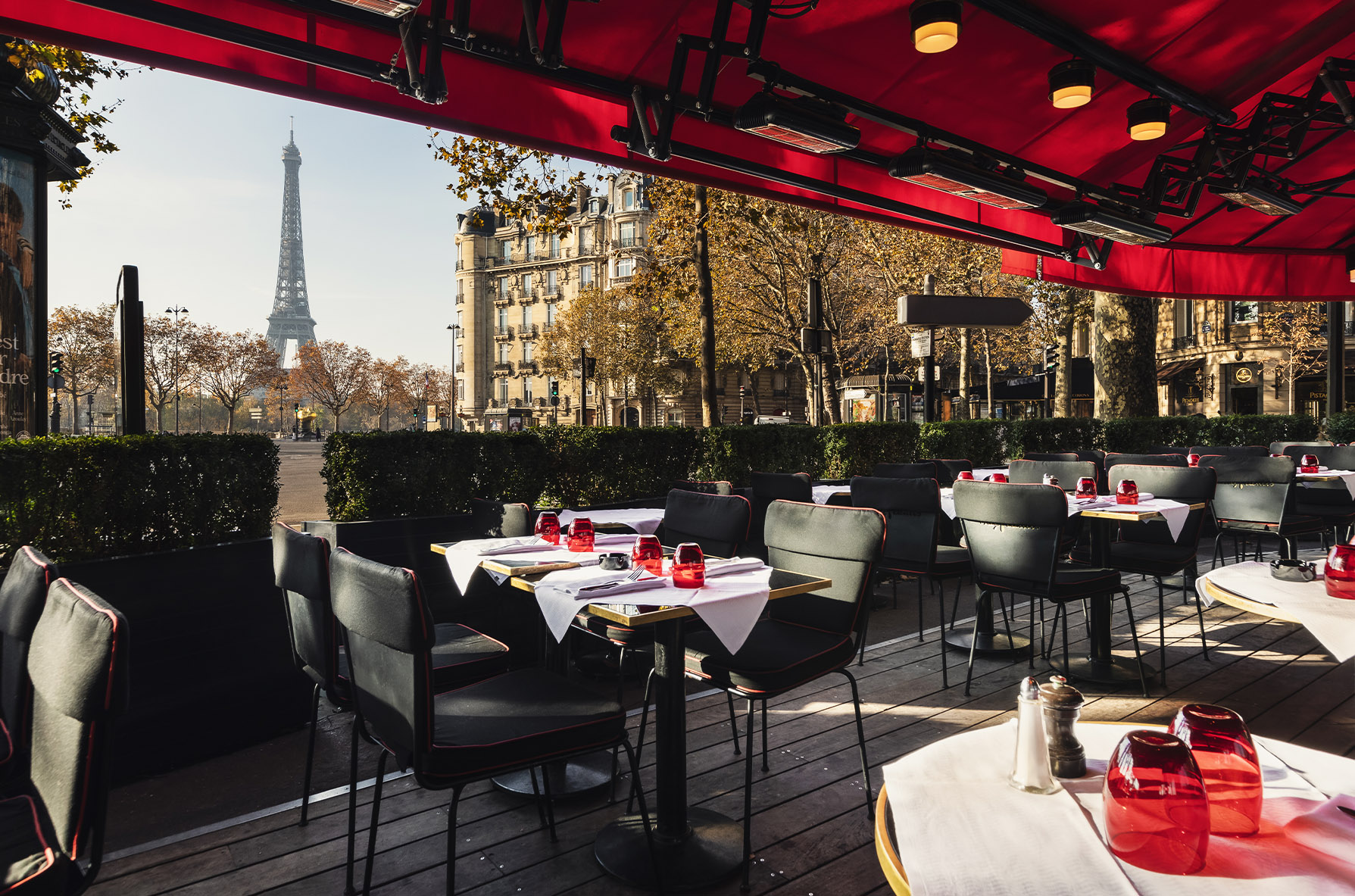
| The views of Paris include the famous Café Francis, established 1959, which is located on the Place de l'Alma, not far from the Chinese embassy consular services on the Avenue Georges V of Paris. The outside view was indeed similar to time portrayed (2004-2006) with cars driving there and few bikes (it is very different in 2024). The transparent waste bags appeared after 1995 when several terror attacks hit the Paris metro. But the interior of the restaurant is fictional : small dark booths with lamps on tables are not frequent in Paris cafés and restaurants. Also, there is indeed a view to the Eiffel tower across the Seine river, but it is not that close as the glimpse seen in ep10. [See also the France Telecom public phone booth described in section 5.4. This one was necessarily fictional since the booths were all scrapped between 2015 and 2017, although finding an old one from the scrap, or renting the last one standing, that now serves as book share depot in a nearby surburb, could be possible.]
|
Pictures for Shanghai views of Fudan, Xihui, etc, can be found in the episodes, and for Yanji, look up section 7 (the production may have settled for a studio impression instead of traveling to Yanbian ; there are few exterior views).
38 x 45' episodes - Airing from June 8 until June 25-26 (final episodes and a bonus 39 one aired in "package" on June 22)
 Interviews (24-6-07, English subtitled): Liu Yifei + Peng Guanying, Wan Qian ; Liu Yifei and Lin Gengxin ; Tong Dawei ; Lin Yi . Interviews (24-6-07, English subtitled): Liu Yifei + Peng Guanying, Wan Qian ; Liu Yifei and Lin Gengxin ; Tong Dawei ; Lin Yi . | Airing and reservations : From April 5, , the TV series "The Tale of Rose" released posters to celebrate the number of reservations for the series on Tencent Video Station (over 1 million in April; over million in May ; exceeding 4 million (400 万) on June 7. The drama was to be broadcast in two consecutive episodes on CCTV-8 Prime Time from June 8; also broadcast exclusively on Tencent Video. Members to be updated with 2 episodes at 19:30 every day in the first week, after initial 4 episodes. SVIP watching it first. (Beijing News). On June 9, "the popularity value on the site had exceeded 29,000, setting a record for the fastest popularity value of an urban drama on Tencent Video to exceed 29,000". (drama Weibo page). On June 15, Huang Yimei’s character popularity exceeded 20 million. (posters below) Platforms to watch it (direct links): The Tale of Rose on WeTV/Tencent ; The Tale of Rose on Viki ; The Tale of Rose on YouTube MZTV Exclusive Chinese Drama channel (each offering different options for subtitles). Other platform, in Chinese: Duboku (from comments) and the uploader Kisskh (with English subtitles until special episode 39). |
"The popularity value of #rose的故事 broke through 31000#, breaking the record for the highest popularity value of an urban drama on the website, and setting a record for the fastest popularity value of an urban drama on Tencent Video" (Drama Weibo, 2024-06-18)
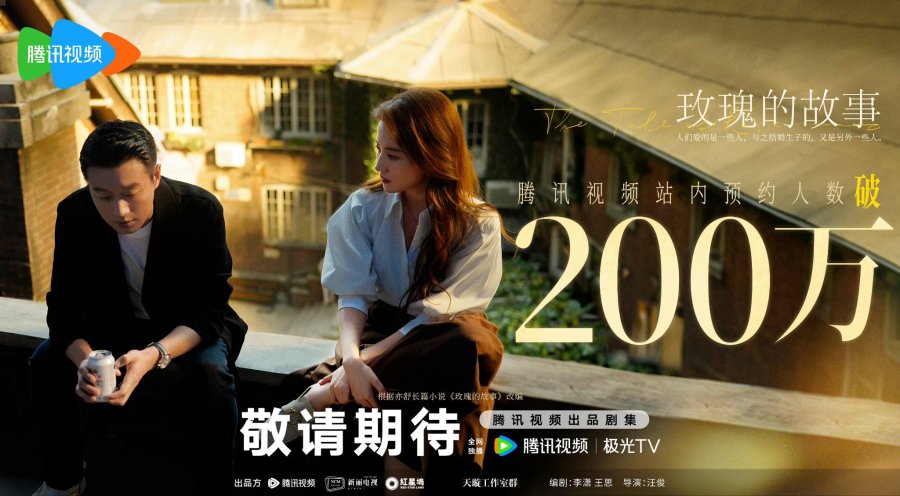 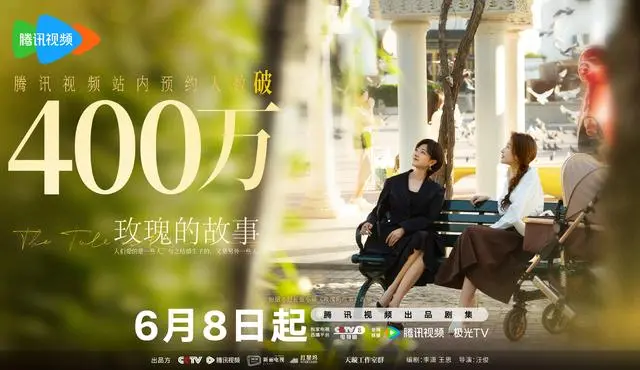 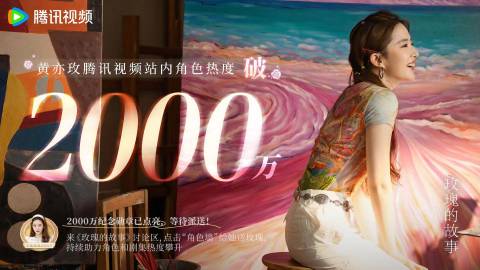 It was among the most popular TV shows in China for the weeks (note any score above 600 points is impressive) , as reported on the Marcus Here! Youtube weekly report.
| Popularity posters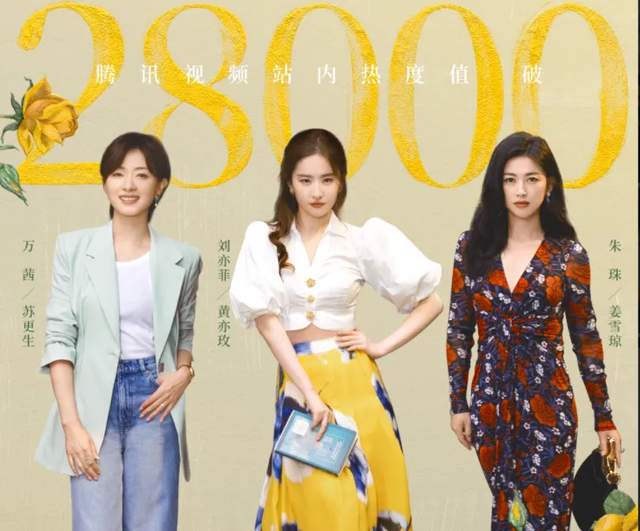 3 female characters : Sū Gēngshēng (Wàn Qiàn) ; Huáng Yìméi (Liú Yìfēi) ; "Tina" / Jiang Xueqiong (Zhū Zhū 朱珠) 3 female characters : Sū Gēngshēng (Wàn Qiàn) ; Huáng Yìméi (Liú Yìfēi) ; "Tina" / Jiang Xueqiong (Zhū Zhū 朱珠)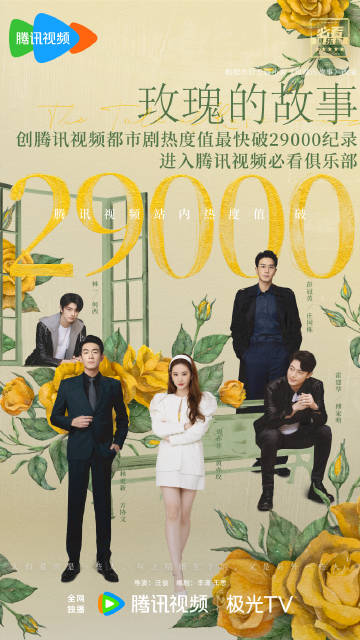 HYM's four men : Hé Xī 何西 , Zhuāng Guódòng 庄国栋, Fù Jiāmíng 傅家明 ; Fāng Xiéwén 方协文 (-> cast, above) HYM's four men : Hé Xī 何西 , Zhuāng Guódòng 庄国栋, Fù Jiāmíng 傅家明 ; Fāng Xiéwén 方协文 (-> cast, above)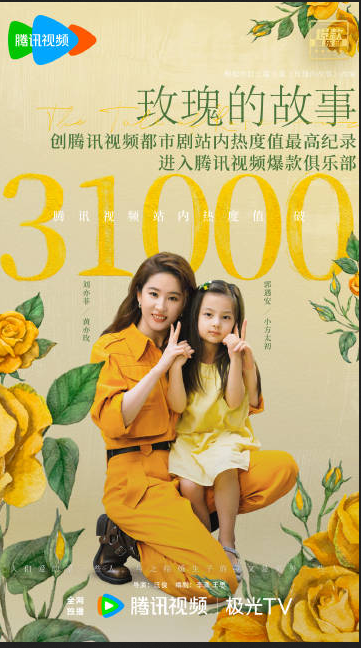 HYM's daughter Fāng Tàichū 方太初 HYM's daughter Fāng Tàichū 方太初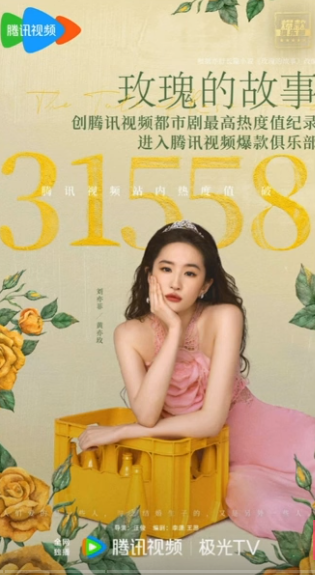 highest heat index highest heat index |
Douban initial rating of June 23 : 7.1 for 84.6K votes
(international audience thought it was too low, would have rated at 8 or above).
Koala's playground noted that Liu Yifei's refusal to hype the drama with CP buzz (like the competing costume drama turned hit, The Double, was, pleasantly with touchy and meteoric rising Wang Xingyue ML), explains also the relatively low key reception of this good S+ drama.
The reporter still noted the "solid reviews"earned by The Tale of Rose got.
(This is why it got better opening rating than the hit costume drama, which garnered a good 6.8 for 70K votes ; for what it's worth, let's mention that among top opening Douban drama to date this year 2024 Jan-Jun, the unusual short drama To The Wonder climbed from 8.5 to 9.4 before settling around 8.9 from more than 235.8K votes on June 12. - still at 8.9 on August 13)
The Tale of Rose Douban rating rose to 7.3 by beginning July, from near to 176K ratings and rising again to 7.4 by August 13 from 222.5 K ratings (last checked)
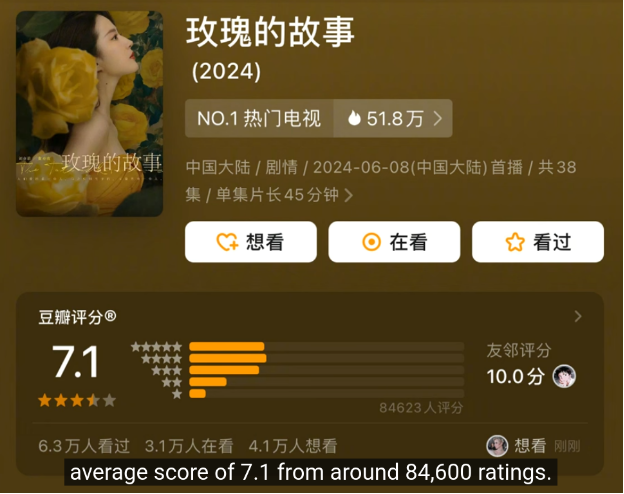
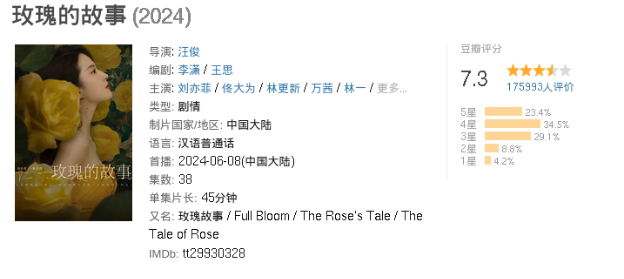
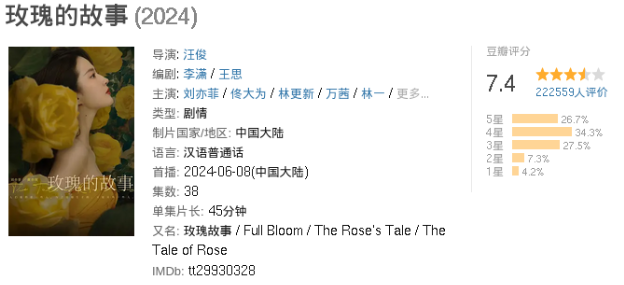 Live stream June 14, 2024 (52'14, English subtitles) : screenwriter Lǐ Xiāo, Liú Yìfēi 刘亦菲, Tóng Dàwéi 佟大为, Lín Gēngxīn 林更新 ("Xiǎo Xīn" 小新), You Ming (host)
Live stream June 14, 2024 (52'14, English subtitles) : screenwriter Lǐ Xiāo, Liú Yìfēi 刘亦菲, Tóng Dàwéi 佟大为, Lín Gēngxīn 林更新 ("Xiǎo Xīn" 小新), You Ming (host)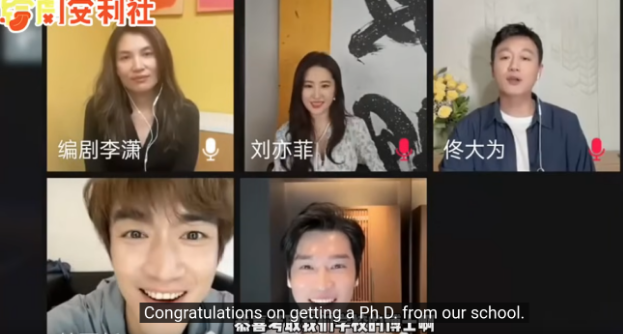
3. Music |
| Music links : 玫瑰的故事 / Mei Gui De Gu Shi / The Tale of Rose (2024) OST by TME影音+ (titles with alternative translations below link to the Dynamic Lyrics Version MV [4K 60HZ Ultra HD Image Quality] | Tencent Music Cloud Channel) with pictures of the singers (names of those linked to biographical note when available): 1. 主题曲/片尾曲《远方的花》(Far away flowers /Distant flowers/ Flowers from afar) 雷佳 Lei Jia 2. 情感主题曲《风吹过的晨曦》(Wind blown morning sun /Wind Blows in the Morning Light) 周深 Charlie Zhou /Zhou Shen 3. 插曲《Shine Brighter》希林娜依高 Curley Gao 4. 插曲《写在星星上》(Written in the Stars) 吴克群 Wu Kequn /Kenji Wu 5. 插曲《Something Worth Saving》孟佳 Meng Jia 6. 插曲《长夜星光》(A long night of starlight) 王赫野 Wang Heye 7. 插曲《Always on my mind》苏运莹 Su Yunying 8. 插曲《手植玫瑰》(Hand planted roses) 米卡 Mika 9. 插曲《Rose Whispers》 刘恋 Liu Lian (Mr. Miss) 10. 插曲《偏航》 (Drift / Off the course) - 王靖雯 (Wang Jingwen) |
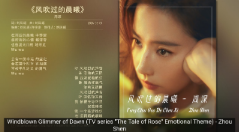 Links to Sarann's playlist of lyrics MV with Hanzi, pinyin, and optional subtitles. Links to Sarann's playlist of lyrics MV with Hanzi, pinyin, and optional subtitles. | 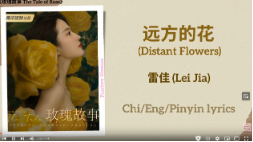 Links to Peachey Blossom's playlist of translated OST songs from the drama. Links to Peachey Blossom's playlist of translated OST songs from the drama. |
Credits for the songs from the Baidu drama page (+ links to other Baidu pages):
| 歌曲 name of song | 作词 lyrics by | 作曲 composer | 编曲 arranged | 演唱者 singer | 制作人 producer |
| 《远方的花》 Flowers from afar | 唐恬 Táng Tián | 彭飞 Péng Fēi | 何山 Hé Shān | 雷佳 Léi Jiā | 彭飞 Péng Fēi |
| 《风吹过的晨曦》Wind blown morning light | 刘凤瑶 Liú Fèngyáo | 刘凤瑶 Liú Fèngyáo | 刘凤瑶/许俊豪 Liú Fèngyáo /Xǔ Jùnháo | 周深 Zhōu Shēn | 刘凤瑶 Liú Fèngyáo |
| 《Shine Brighter》 | 徐行/黎栩晴 Xú Xíng/ Lí Xǔqíng | 黎栩晴 Lí Xǔqíng | 黎栩晴 Lí Xǔqíng | 希林娜依·高 Xīlínnàyī Gāo | 袁文睿 Yuán Wénruì |
| 《写在星星上》 Written in the stars | 马力遥 Mǎ Lìyáo | 姚御正 Yáo Yùzhèng | 许俊豪/姚御正 Xǔ Jùnháo /Yáo Yùzhèng | 吴克群 Wú Kèqún | 刘凤瑶 Liú Fèngyáo |
| 《Something Worth Saving》 | 王浩/安吉拉.穆库尔 Wáng Hào/ānjí lā. Mù kù ěr | 王浩/安吉拉.穆库尔 Wang Hao, Angela Mukul | 袁文睿 Yuán Wénruì | 孟佳 Mèng Jiā | 袁文睿 Yuán Wénruì |
| 《长夜星光》 Long night starlight | 舒望 Shū Wàng | 王齊宇 Wáng Qíyǔ | 袁文睿 Yuán Wénruì | 王赫野 Wáng Hèyě | 袁文睿 Yuán Wénruì |
| 《Always on my mind》 | Zhào Qí | 罗米 Luō Mǐ | 刘苏毅 Liú Sūyì | 苏运莹 Sū Yùnyíng | 孙伟 Sūn Wěi |
| 《手植玫瑰》 Hand planted roses | 林乔/午上 Lín Qiáo /Wǔ Shàng | 郑阵焕/李政远 Zhèng Zhèn huàn /Lǐ Zhèngyuǎn | 郑阵焕/李政远 Zhèng Zhèn huàn /Lǐ Zhèngyuǎn | 米卡 Mǐ Kǎ | 林乔 Lín Qiáo |
| 《Rose Whispers》 | 田园 Tián Yuán | 陈诗牧 Chén Shīmù | 嫩口 Nèn Kǒu | 刘恋 Liú Liàn | 陈诗牧 Chén Shīmù |
| 《偏航》 Off course | 陈可心 Chén Kěxīn | 王泽鹏 Wáng Zépéng | 许俊豪 Xǔ Jùnháo | 靖雯 Wáng Jìngwén | 刘凤瑶 Liú Fèngyáo |
4. Character Relationship chart |
Character relationship chart (click on or open in other tab to enlarge)
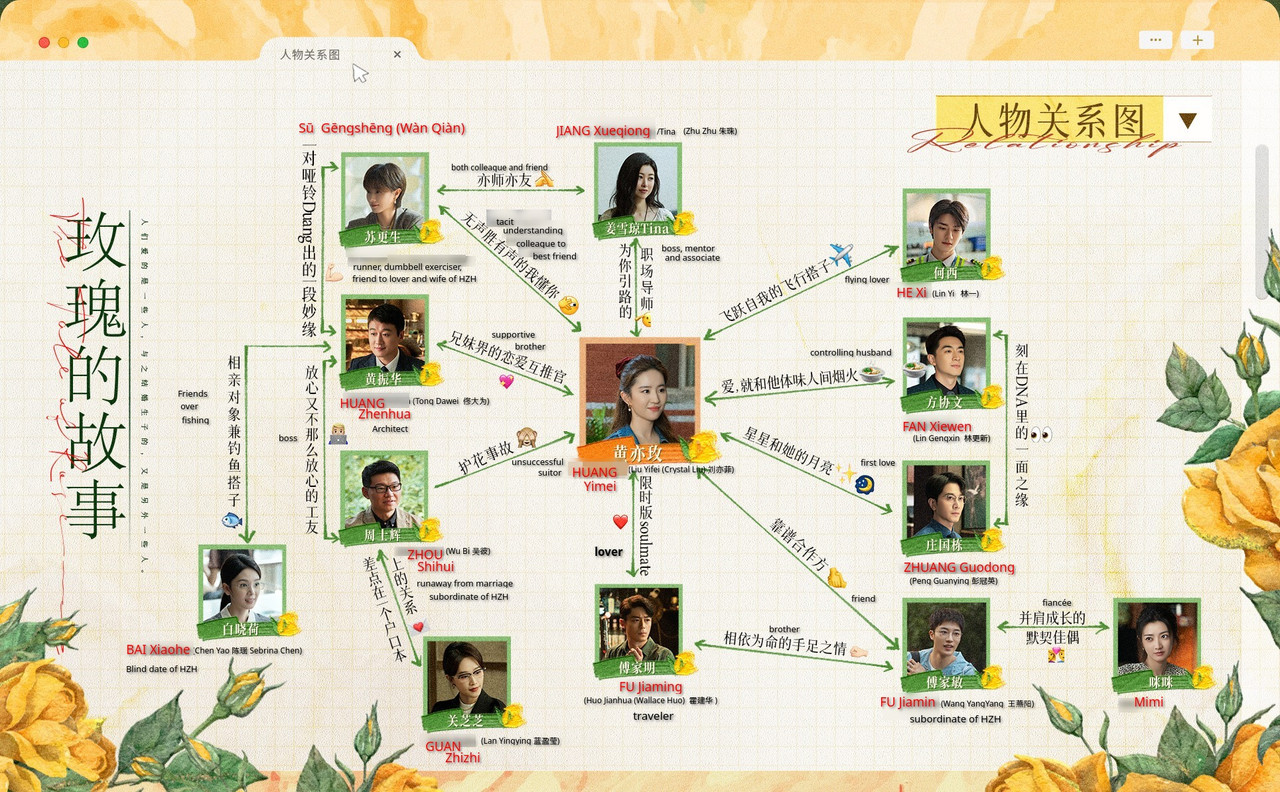
Portrait gallery :
Name of character, description, first appearing in episode -, actor or actress
- Huang Yimei /Meigui (carefree art student in Beijing, skating into life with a purpose, ep.1) - played by Crystal Liu
- Fang Xiewen (student at Fudan, computer scientist ; future husband of HYM and startup builder, ep. 13) - played by Lin Geng Xin (guest role)
- Fu Jiaming (musician, traveler, soulmate of HYM, ep. 28, at his brother Jiamin's birthday) - played by Wallace Huo (guest role)
- Zhuang Guodong (Eric, manager at Galant gallery in Beijing, with connections to France, ep.3) - played by Peng Guan Ying (guest role)
- Huang Zhenhua (Meigui's older brother, architect at an institute, before launching his own company, ep.1) - played by Tong Da Wei
- Su Gengsheng /SuSu (deputy director at Cyan gallery in Beijing, friend of director Tina, soon also best friend of Meigui, ep.2) - played by Wan Qian
- Jiang Xueqiong /Tina (director of Cyan art gallery, mentor and friend of Susu and Meigui, suffering from alcohol dependency and an ulcer, ep.2) - played by Zhu Zhu
- Bai Xiaohe (a Chemistry PhD, blind date for HZH introduced by a colleague of his parents, ep.3) - played by Sebrina Chen (guest role)
- Huang Jianzhi (father of HZH and HYM, retired professor from Qinghua university, ep.1) - played by Hou Chang Rong
- Bai fu (father of BXH and rich property developer, ep.7) - played by Gao Shu Guang (guest role)
- Zhuang fu (father of ZGD. retiree in Beijing, ep.5) - played by Liu Jun (guest role)
- Lin Hao (friend and dormmate of FXW, later part of the initial team of the startup, ep. 13) - played by Ding Chuan
- Wu Yuejiang (mother of HYM and HZH, retired professor from Qinghua university, ep.1) - played by Fenny Wu
- Song Jiaqi (Zhuang Guodong's mother, ep.5) - played by Yu Hui (guest role)
- Guan Zhizhi (ex fiancée of Zhou Shuihui, ep.1-2, 25) - played by Lan YingYing (guest role)
- Xiao Xiaoyu (employee of FXW from the merged firm, ep.28) - played by Chi Ning Ning
5. Miscellaneous details5.1. Money |
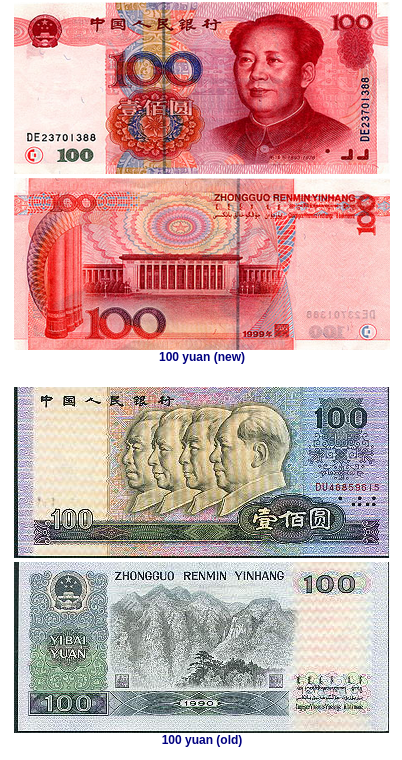  | MONEY (ep.2) when Yimei wants a mobile phone because pagers are outdated in the early 2000s, her father gives her some money from a stash of 100 yuan banknotes concealed in a bag at the bottom of a flowerpot ! In 2008, at the time the article showing the two visuals to left was published, 1yuan, 5yuan, 10yuan, 50 yuan banknotes came in two designs and different colors. So, the 100-yuan banknote had two types -- one in gray blue which debuted in 1990 while the other in red was first released in 1999. "The 1990-type note has a portrait of four former Chinese leaders, namely Mao Zedong, Zhou Enlai, Liu Shaoqi and ZhuDe, on its obverse while its reverse is the Jinggangshan Mountain in South China. Very few of the 1990-type 100-yuan paper notes are currently (2008) circulated in China." Numismatic info further informed that the grey blue note was introduced in 1988 (even when printed with 1980 date) and finally retired on May1, 2019. |
"As of 2023, there have been five series of renminbi banknotes issued by the People's Republic of China: .... The fourth series of renminbi banknotes was introduced between 1987 and 1997, although the banknotes were dated 1980, 1990, or 1996 (includes BLUE GREY ¥100 ). They were withdrawn from circulation on 1 May 2019. ....The fifth series of renminbi banknotes (Mao Zedong only design) and coins was progressively introduced in 1999. This series also bears the issue years 2005 (all except ¥1), 2015 (RED ¥100 only) and 2019 (¥1, ¥10, ¥20 and ¥50 in other colors). Both 4th and 5th series were legal tender and circulated simultaneously for a number of years (Wikipedia) |
5. Miscellaneous details5.2. Product placement and ads : Jianlibao energy drink, Six God, etc |
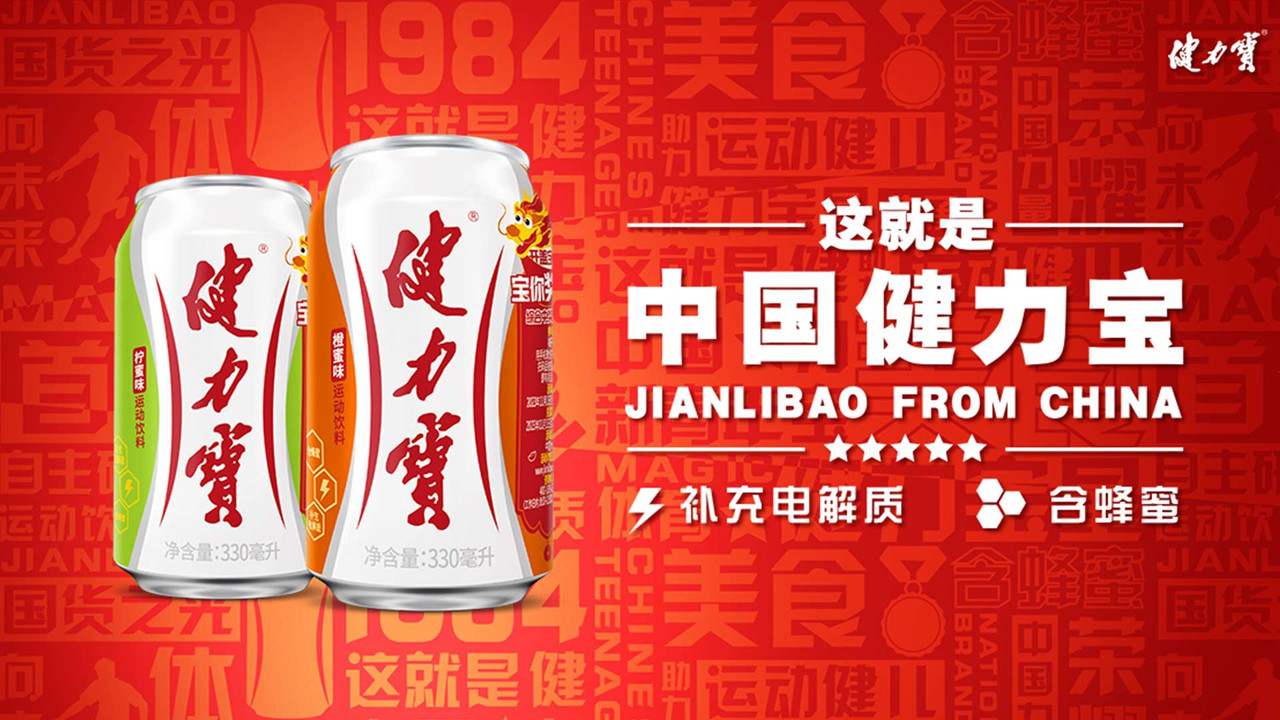 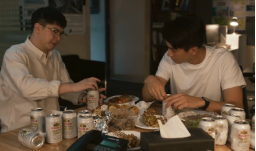 FXW having a meal of bbq skewers with his colleague Xiao Zhou (played by Du ShuangYu) and drinking Yanjing beer at his office in Shanghai. (ep.24) FXW having a meal of bbq skewers with his colleague Xiao Zhou (played by Du ShuangYu) and drinking Yanjing beer at his office in Shanghai. (ep.24)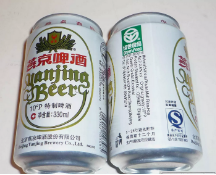 Yanjing 10ºP Light Beer (ABV less or equal to 3.6%. Yanjing 10ºP Light Beer (ABV less or equal to 3.6%. |  “Once in the same frame as many Olympic athletes the classic white and green packaging" of the Jianlibao 健力宝 ("Health-Strength- Treasure") energy drink (with natural linden tree honey and alkaline electrolytes) was very popular from company launch in 1984. “Once in the same frame as many Olympic athletes the classic white and green packaging" of the Jianlibao 健力宝 ("Health-Strength- Treasure") energy drink (with natural linden tree honey and alkaline electrolytes) was very popular from company launch in 1984. In the early 1990s, it was the top soft-drink company in China, and its brands were best-sellers on a par with Coca-Cola and Pepsi, and nicknamed China’s magic water for the role it was believed to play in the Chinese athletes’ success. Although the drama features some alcohol drinking, product placement for beverages is mostly for Coca Cola and Ginger Ale in this series, apart from some episodes with Jianlibao cans and Yanjing beer (a famous pale Lager 4.2% to 12% proof Beijing brew that comes in different packagings, such as glass bottles or other color and size cans : the blue one was often found on Chinese airlines.). "Beijing Yanjing Brewery (listed on Shenzhen Stock Exchange SZSE: 000729) is a brewing company founded in 1980 in Beijing, China. Yanjing Beer was designated as the official beer served at state banquets in the Great Hall of the People in February 1995." "It has been the largest selling beer in China for ten consecutive years now. It was one of the major sponsors of the 2008 Beijing Olympics. --Yanjing Beer is brewed with pure mineral water collected 300 meters beneath the Yanshang Mountain and is certified “Green Food” ("polution free"." |
In same episode 7, Huang Zhenhua jokingly asks Zhuang Guodong if he knows what "Six God" is.
According to this Baidu article, it is made by a Shanghai company and has captured as much as 70% of the toilet water market in China. Perhaps they retroactively filed the patent in an (undoubtedly vain) attempt to ward off imitators and imposters. -- The main ingredients are said to be pearl powder and musk (zhēnzhū fěn 珍珠粉 shèxiāng 麝香). Ordinarily, "eau de toilette" is translated into Chinese as : huālùshuǐ 花露水 (lit., "flower-dew-water"). As for the six gods ? " In traditional Chinese culture, the concept of liùshén 六神 ("Six Spirits") can refer to several different sets of six supposedly numinous entities. These include these six organs of the body and their presiding spirits: xīn 心 ("heart")、fèi 肺 ("lungs")、gān 肝 ("liver")、shèn 肾 ("kidneys")、pí 脾 ("spleen")、dǎn 胆 ("gall bladder") "Six Spirits" may also refer to six supernatural creatures with astrological correlations. If you want to know what they are, you can read about them here (in Chinese) and here (in English). The notion of "Six Spirits" conveys the idea of power and well-being, so they are often employed in the names of various pills and prescriptions. Suffice it to say for this "Six Spirits itch stopping toilet water", if you're feeling itchy and apply it to your skin, then you're bound to feel good all over because it has "the power". " (Language Log 2015) In fact, I have often seen the Liushen mosquito repellent toilet water bottle pictured above (95ml/195ml) in summer, among many things attempting to ward off the dreaded tiger mosquitoes... |
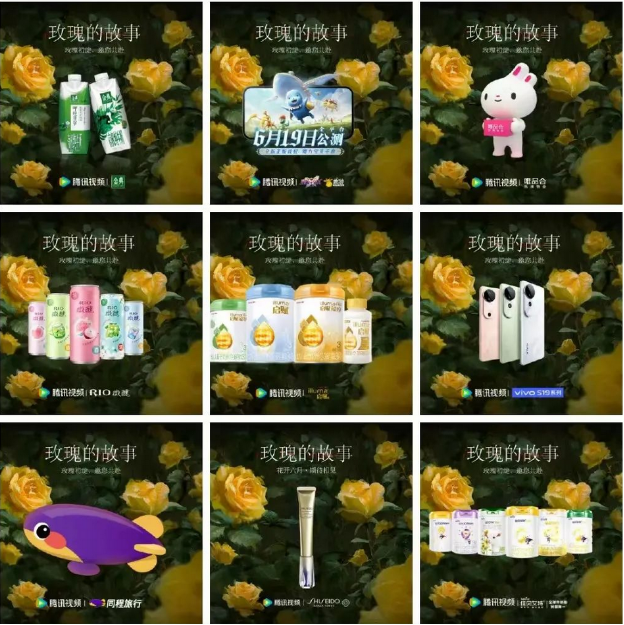 "Works adapted from Yi Shu are very popular among investors." "Works adapted from Yi Shu are very popular among investors." | SOAP OPERA DISRUPTIONS"Before the show started, there were as many as 34 officially announced investment brands, including 10 official co-branded brands, temporarily ranking first among Tencent Video. As of episode 11, all 10 ad slots in each episode were filled, from the synopsis, opening credits, mid-roll ads, to the end credits. Even VIP users who have paid for the service have to watch 90 seconds of advertising in a 40-minute episode. The brands range from Jindian milk and Xizhilang jelly to Shiseido skincare products and vivo mobile phones, which shows the wide scope of investment. Even Durex [condoms] found suitable placement scenes in many passionate scenes." (New Classics Media and Yi Shu's Business Philosophy, article on Baidu, in Chinese, 2024-06-16). |
5. Miscellaneous details5.3. Cars and class differences, motorbikes ; license plates details |
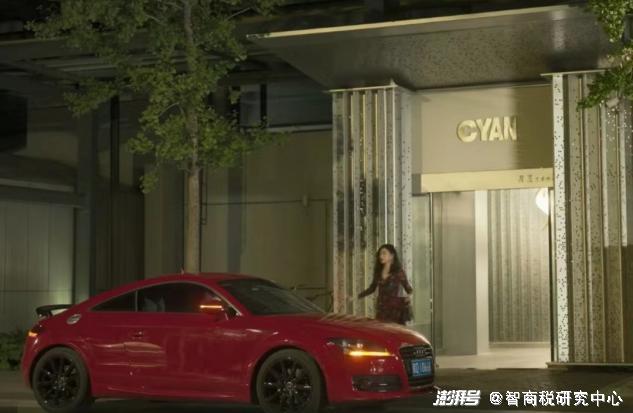 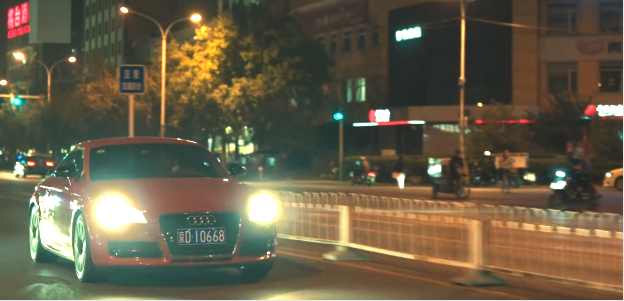 The Volkswagen Group has three joint ventures in China since 1984, 1991 (including Audi Group) and 2017. They produce cars and components in 33 plants in Shanghai, Changchun, Dalian, Nanjing, Yizheng, Chengdu, Foshan, Ningbo, Changsha, Urumqi, Hefei and Tianjin. The Volkswagen Group has three joint ventures in China since 1984, 1991 (including Audi Group) and 2017. They produce cars and components in 33 plants in Shanghai, Changchun, Dalian, Nanjing, Yizheng, Chengdu, Foshan, Ningbo, Changsha, Urumqi, Hefei and Tianjin. | Cars and class differences. In 2006, architect Huang Zhenhua was still driving his old white square faced VW Jetta while his first love interest, rich heiress and chemistry researcher Bai Xiaohe (played by Chen Yao) was driving a silver grey Audi in ep.18. Huang Yimei's boss Tina at Cyan art gallery also had a more sports like red Audi TT. (" The price tag of the Audi TT coupe in the play was over 600,000 yuan at the time. It was once the dream car of many people"). These foreign vehicles (now manufactured in China) were also clues to the high social levels: people with high status often drove or were driven in black VW cars in the early 2000s. The license plates (京D 32579 for the VW and 京D 100R8 for Bai Xiaohe's Audi, 京D 10668) also reveal their age, and the place they were issued in: 京 is the prefix for Beijing (capital), and is followed by a letter + 5 numbers (or now, number an letter combinations) in white on blue for passenger vehicles : either 京C, 京E, 京F, 京H, 京J, 京K, 京L, 京M, 京Q for urban areas, 京N, 京P, 京Y: Suburbs and urban area, 京G, Y outside urban area. So, the Huang family car has a very old license plate going back to mid or end 1990s! since other combinations of letters and numbers were used from 1992, as the number of registered cars continued to grow. Also, both 京D plates are very unusual, since D is not for the district but... for "police and other authorities"!) |
How to curb traffic congestion. The Beijing government imposed in the mid 2000s an odd-even license plate system to reduce the number of the cars on the roads during special events and extreme weather conditions. Cars have to drive on alternate days, based on the license plate number. Cars not from urban areas are only allowed to drive in the city at certain hours. (This alternate system and out-of-town one unfortunately also pushed car owners to buy a second car, so the quota system reinforced the limits to cars on the congested capital streets. ) A quota system was introduced since 2011 : only 240,000 license plates were issued that year, compared with 700,000 the previous year. The license plates were issued only for permanent residents of Beijing. Today, "Beijing is one of the most restrictive cities in China for car purchases, given its highly dense population and severe traffic congestion problems. For residents who previously did not own a vehicle with a local plate, they would need to first obtain a vehicle purchase quota in a lottery system before they could purchase a vehicle. For residents who have previously owned local license plates, they can continue to use their past plates when replacing their vehicles. -- Beijing had more than 6 million cars as of the end of June 2022, and 70% of new license plates were for electric cars," the license plates of which use black lettering on Gradient green. (Desirable/undesirable license plates : Some combinations of letters or numbers are very desired, but some, on the other hand, rather rare, are not, i.e. "USA 911 or 250 (an insult in spoken Chinese: 250, èr
Although one might think universities and hi-tech district Haidian vehicles might have a 京H license plate, or cars in more residential Chaoyang might have a 京C one, this is not so sure as a clue to district (unlike in other Chinese cities), because Beijing residents move about within the city, but once they acquired a car, they can keep the license plate for new car and new address. This may also explain Tina's unusually "old" license plate: possibly an imported brand new car via Hong Kong, where her old and rich husband lived, new luxury car inheriting the old number plate from a previous car. |
 (ep37) Huang Yimei's Triumph motorbike and its 京A license plate. (ep37) Huang Yimei's Triumph motorbike and its 京A license plate.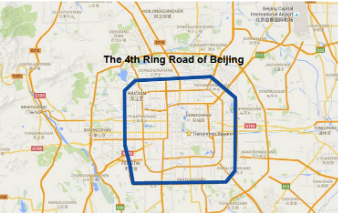 Most motorcycle dealerships are located on the 4th Ring Road (there are 6 Ring roads around Beijing which is the size of a country). The sign below shows what vehicles are not allowed on expressways. Most motorcycle dealerships are located on the 4th Ring Road (there are 6 Ring roads around Beijing which is the size of a country). The sign below shows what vehicles are not allowed on expressways.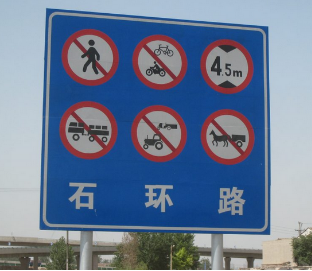 | To ride a motorcycle in China, one must complete a test and have documentation and approval of the bike, get license plates, usually 京B for locals to be able to drive in Beijing. But 京B plates cannot be owned by a foreigner, and 京A ones (for foreigners) are restricted for use outside the 4th ring road. In fact, even with 京B plates, it is not allowed to ride motorbikes in city center (within 2nd or 3rd ring in Beijing) : motorcycles are prohibited to drive into the center of many major cities. So, motorcycles are prohibited in the vicinity of the Forbidden City and Tian an Men. They also are not allowed on most expressways and motor-roads. But they can be used, even with side cars, to explore some country roads. The 京B plates can be traded. Some foreigners use them (switching) at their own risks (either the bike might be seized or the biker might be sentenced - but actually few bikers risk much hassle if they keep to authorized roads.) It would be difficult to ride from Haidian to Cyan gallery with it, although the universities are close to 4th ring. It would be possible to ride to airports and to outlying art districts such as Dashanzi 798, Caochangdi (which are still just outside 3rd Ring) but easier if the new Vine gallery was located in Songzhuang, Tongzhou suburb, although that's far from Haidian as in having to drive over an hour from west to east. In fact, to ride own motorcycle in China is still quite a rare thing. The Triumph motorbike was likely not purchased originally in Beijing, since there is no Triumph dealership in the country (the closest one is in Thailand!), but could be an imported one. If from the Tiger 1200 rally Pro series, it would cost about US$22,000 to 26,500 new, and could last around 100,000 miles if it is properly maintained. But He Xi informed Huang Yimei that "according to regulations, motorcycles have to be scrapped after 13 years of use in China" after she told him she had rode it for 6 years already. |
5. Miscellaneous details5.4. Phones, computer hardware and software |
 Rosie's first Nokia phone on which she received the job offer at Cyan art gallery. Rosie's first Nokia phone on which she received the job offer at Cyan art gallery. 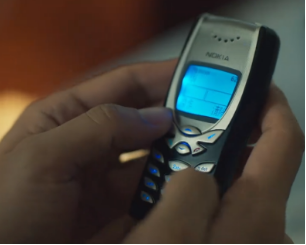 Huang Zhenhua's Nokia, on which he texted his sister and his blind date Bai Xiaohe Huang Zhenhua's Nokia, on which he texted his sister and his blind date Bai XiaoheCell phones had become a signature of the times (even to inspiring a famous 2003 Chinese movie : Cell Phone )
Lin Gengxin's personal iPhone 15 Pro Max (marketed from September 2023) - Weibo LGX has got several phones and also a connected watch (picture right, with second phone on his knees). | Phones, hardware and software. The production did pay attention to bring in phones and computers that were in sync with the early 2000s period. Some of those may look expensive for the means of a "scholarly family" undergraduate daughter who looks for work less for money than for experience. It has been noted that the parents of HYM were "professors with a monthly salary of more than 1,000 yuan." (this would be the fixed salary not including the revenue that the dad might have from publications and possible outside conferences). Besides, money could have been brought home by her elder brother, an architect with managerial position at an institute. A frequent guest at his parents' home, he doted on his sister and might contribute to some "luxury". So, because by that time, pagers were disappearing, as were public phone booths, "Huang Yimei bought a new mobile phone after graduating from university, which was equivalent to one month's salary of her parents" (but she only asked for about half of the price tag to be sacrificed from the hidden savings in the flower pot!). In ep.7, Zhuang Guodong (who used an Alcatel mobile handset from France) spelled out his phone number to Huang Zhenhua : 139 6676 312. This is a realistic phone number for the period and people using China Mobile phone numbers, which start with 135 or 139. (Landline phone numbers in Beijing may look like this: 010–12345678) Country code for China is 86 when phoning in from abroad. To make and display their string of instant photographs of smiles, grins, and grimaces, ZGD and HYM used a "Fujifilm Instant Camera mini20, which looks like a big shell" in ep7:
 (ep4) Huang Zhenhua using QQ on his home computer to exchange messages with Bai Xiaohe (ep4) Huang Zhenhua using QQ on his home computer to exchange messages with Bai XiaoheNext, the phones and desktop or laptop computers in the series were at first mostly company ones, except for Huang Zhenhua's home computer (on which he messaged through QQ, the service developed by Tencent from 1999, which has over 500 million activ accounts in 2023) and when Huang Yimei moved into Zhuang Guodong's apartment. ZGD had a very rich businesswoman mother (who could be almost as controlling as Daoming Feng the fearsome mother in Meteor Garden), and his dad was not a pauper: he lent a wholly owned modern furnished apartment to his son (the Zhuang couple might have started gambling on the property market that made fortunes for some who purchased cheap and rented expensively in the 2000s, like SOHO group). ZGD was already used to have long distance video calls with his mother abroad. Huang Yimei a quick learner, mastered those tools too. In Paris, ZGD also experienced phoning from a France Telecom public phone booth, using a prepaid card. In China too, there were public phones such as the China Unicom ones that once lined Beijing sidewalks with their curved eggshell orange half shelter (other designs existed for the competing companies such as China Telecom); they disappeared in the late 2000s-mid 2010s, when mobile phones totally won over from antiquated landline phones. (Today China is covered in most places by 5G).
Later, Fang Xiewen, newly graduated from a Shanghai, majoring in computer science, joined a software developing company, but handed in his resignation after a dispute about problems with data involving a disk. Storage was still somewhat rudimentary in the 2000s, involving the necessity to have several safe hard disk copies, stored physically in storage units that were not using connection to Internet. Intranets were starting to appear, while cloud storage was still in the future. In 2013, a few years after the 2008 Olympics, they all used personal laptops and smartphones with various apps to send and receive e-mails, take pictures etc. Fang Xiewen even installed a spyware tracker on his wife's iPhone, causing her to lose any trust she still had in Fang and in their marriage, and to demand a divorce (ep.27). In the mid 2010s, WeChat introduced payment apps linked to the phone owners bank accounts, and mobile payments became the norm. Along the drama, we can see the rapid evolution of telecom and computer hardware and software in those twenty years (2000s to 2020s). |
5. Miscellaneous details5.5. Luxury bags and items, fashion |
 Bai Xiaohe's Birkin bag Bai Xiaohe's Birkin bag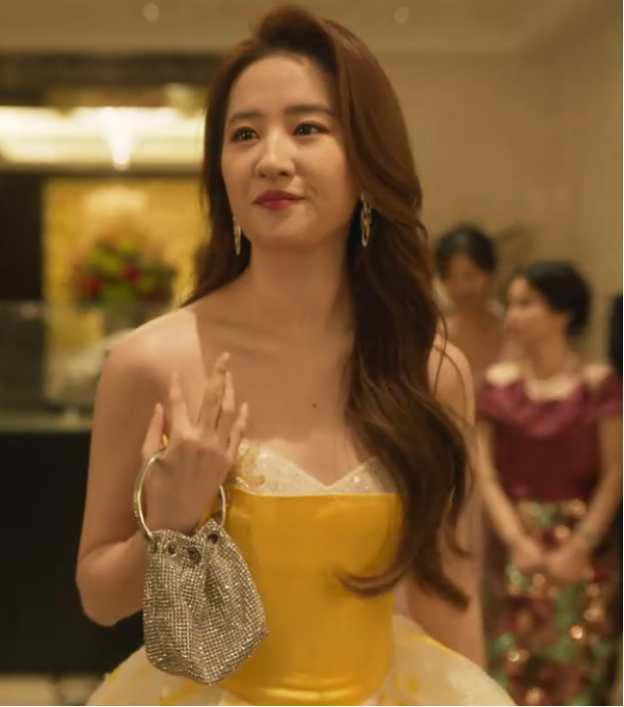 Huang Yimei's crystal bag in 2004 (date given by a radio snippet in ep.4 where Zhuang Guodong/Eric remembers his view of their first meeting in ep.3) Huang Yimei's crystal bag in 2004 (date given by a radio snippet in ep.4 where Zhuang Guodong/Eric remembers his view of their first meeting in ep.3)
| Luxury bags and items. Huang Zhenhua knew enough about fashion to recognize that Bai Xiaohe's bag was likely an expensive Hermès designer one of the famed Birkin bag series created in 1984. BXH dismissed it as "old"... (ep3) Of course, it could have been a cheap imitation, as many fashion items in China were circulating as counterfeit in the early 2000s. But if genuine, that should have been a first clue for him about his blind date's social status. Likewise, Huang Yimei had very beautiful scarves, dresses, and bags... If they were not "borrowed from the collections of richer friends" (in her art circle) or "imitations", some of these items would appear unbelievably pricey to be "owned" by her in a "realistic" series. The crystal studded one in ep.3 was estimated by some luxury brand observers at a 36,000 yuan price tag! It could be a Valentino Garavani Carry Secrets since the model debuted in 1968 (if it is one, it would have a VLogo signature plaque at the front) or a Jimmy Choo Bon Bon (but Jimmy Choo did not branch into designing handbags before 2006, after which their women bags caught on like wildfire, just like their shoes!) In ep.6, there is, on a table, a "more modest", Valextra Iside pyramidal handbag with a top handle and a rotating clasp (these bags have a detachable shoulder strap) and signature black lacquered Costa edges that are painted by hand (but it still is a luxury brand from Milan and this bag is decidedly anachronical since it was first introduced in 2011). |
Huang Yimei's fashion outfits are departing from the realistic vein of some other items to show anachronistic pieces which are unrealistically pricey : this is where the story leaves the naturalistic depiction of an era to give fairy-tale touches where the young lady is effortlessly capable in many fields, can work ovetime and despite being in "unbudgeted" positions where she perhaps works for free, for experience, seems able to afford the rosy-hued lifestyle of wealthy princesses. (That can also be criticized as "Mary Sue" tropes). But the choice of cuts and colors, sometimes material like the yellow plastic earrings matching the yellow hair tie, do give an "impression of past decades more carefree times" when the Chinese economy was booming with double digit growth. (Is it over now? Some Quorans don't think so).
In all the episodes where Huang Yimei appears, none of her clothes are repeated. Costume designer Ivan Ai did a good work to showcase the actress as if she was on "runway", and did not forget the other characters, Tina, SuSu, Bai Xiaohe, Mimi, little Taichu, and the older or male characters. Here are some beautiful and interesting pieces from the series, that were researched and described in an online article (which leans somewhat too much on the detractors' side), and an example of a pop-up ad for an online discount clothes shop:
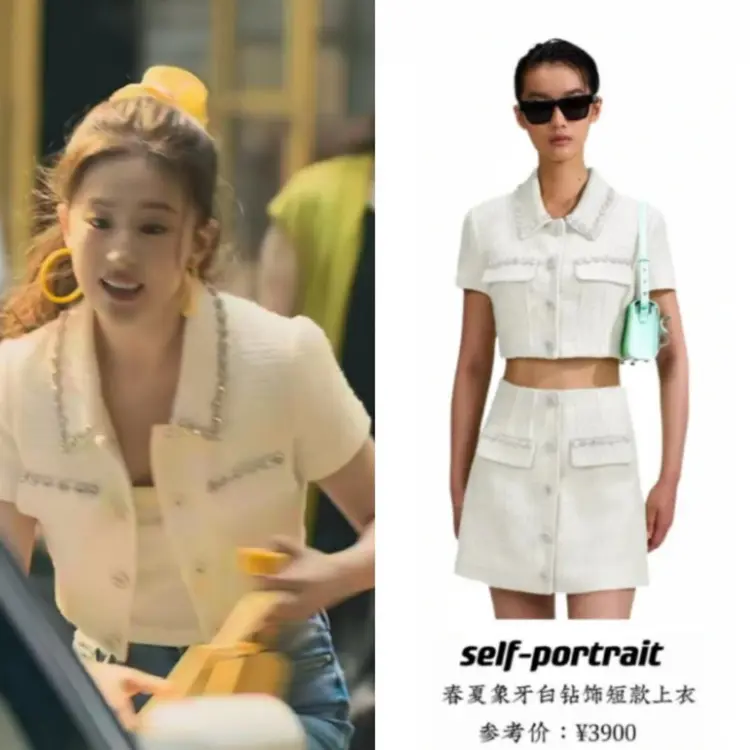 "The diamond-studded top Huang Yimei wore during her internship was worth 3,900 yuan, a blue coat was worth 6,684 yuan, and a silk dress was worth 9,375 yuan." “FASHION IS NOT ABOUT ONESELF, IT'S ABOUT THE PEOPLE WHO PHYSICALLY WEAR IT, IT’S ABOUT RESPECTING THEM AND THEIR COMFORT.” (Han Chong) | "Self-Portrait was established in 2013 by Han Chong in London, with a creative vision to make beautiful design accessible to all women. The Malaysian-born designer unites a refined aesthetic with a deft understanding of structure and materials that has propelled the brand’s meteoric rise and upended the contemporary fashion market. Designed in London, made for the world - Self-Portrait believes in celebrating and empowering women with clothes. Femininity ensured by elegant functionality, reflecting a sincere engagement and appreciation for a contemporary way of life." (self-portrait website) The brand has 12+ outlets stores in Mainland China (flagship S8-12, 19 Sanlitun, Beijing), Taiwan, Macau, Thailand, London... |
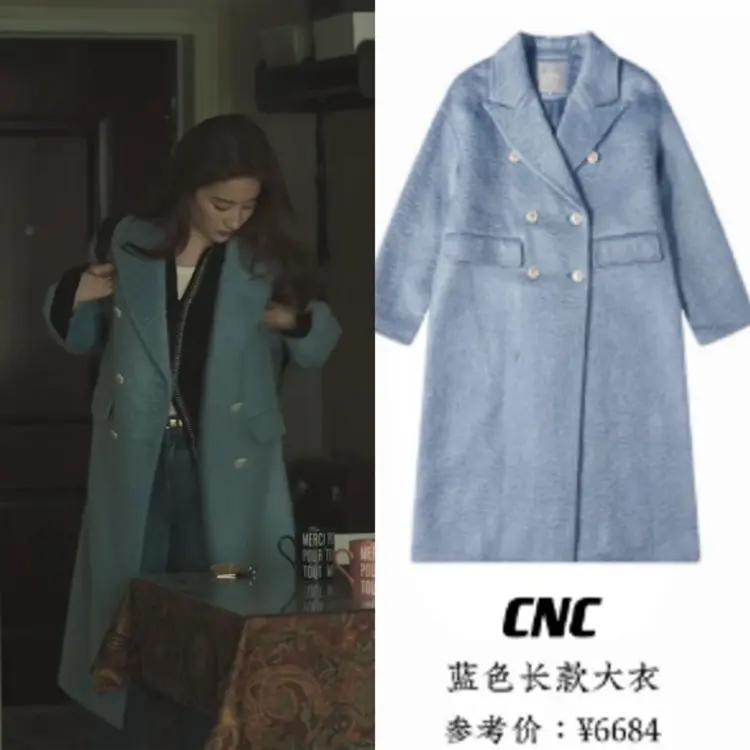 | Perhaps "C'N'C CoSTUME NATIONAL " This is a man/women’s garments notorious luxury brand. The founders are designer Ennio Capasa and his brother Carlo, who is the brand's executive director. The brand's creators presented their first collection at Milano Fashion Week in 1986 and debuted in Paris in 1991. In the late 1990s, the brand opened boutiques in Rome, New York, and Los Angeles and launched footwear and accessories. The brand's minimalist, slightly rock 'n' roll style with a predominance of dark colors and laconic shapes was influenced by Ennio Capasa's years of work with Yoji Yamamoto. (website) |
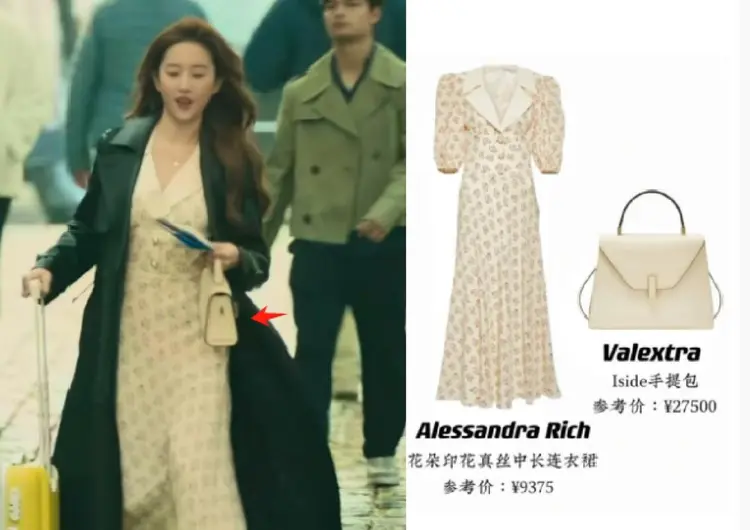 Alessandra Rich silk print dress paired with a Valextra bag (there are at least 3 Valextra bags, in different colors, in the series: beige, yellow, and red - see above, bags part.) | "Alessandra Rich stands as a women's fashion label that defies the confines of passing fashion trends. It embodies an unbounded notion of femininity, devoid of stereotypes, uniting a collective of women who delight in the playful exploration of fashion. Established in 2010, the brand has offices in London and Milan. Showcasing in Paris, the collections mix the effortless Parisian allure, the impeccable Italian craftsmanship and a dash of Brit rebelliousness, paying homage to the essence of women as they take centre stage, seamlessly blending elegance, irony, and self-confidence." (company website) |
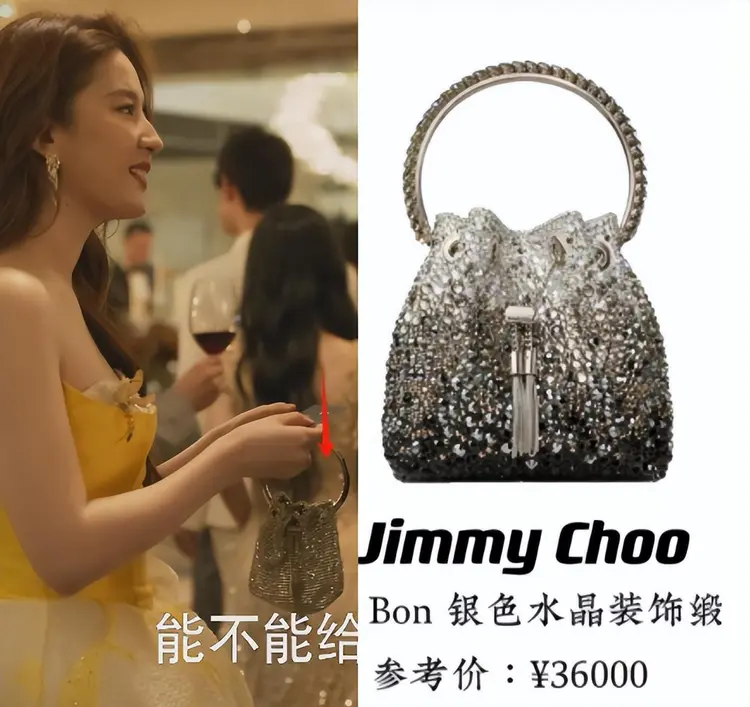 | See in the previous bags collection details. So, this was indeed an anachronistic Jimmy Choo Bon Bon bag. |
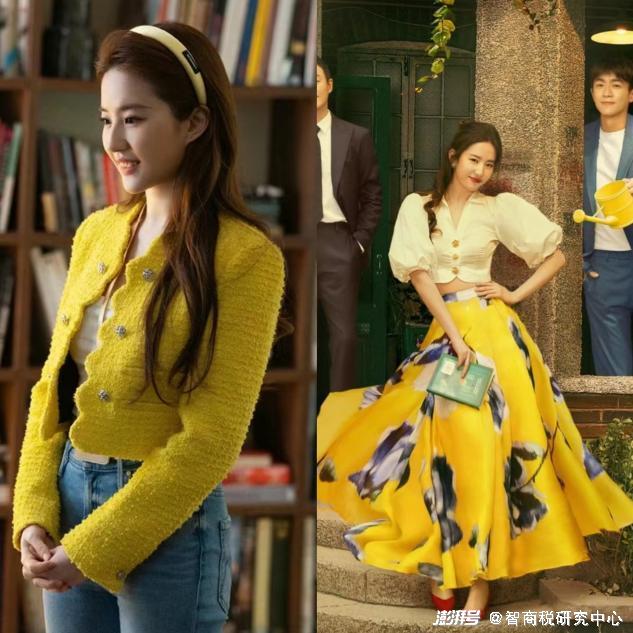 | Love of sunny yellow colors: a Chanel-style jacket, paired with a white suspender and tight jeans (ep7 in the office). A white puff-sleeved shirt, paired with a yellow fluffy long skirt. (seen in ep7 when HZH drove ZGD and HYM to the sinopec petrol station, where they had a game of "can-basket" with the energy drink cans".) |
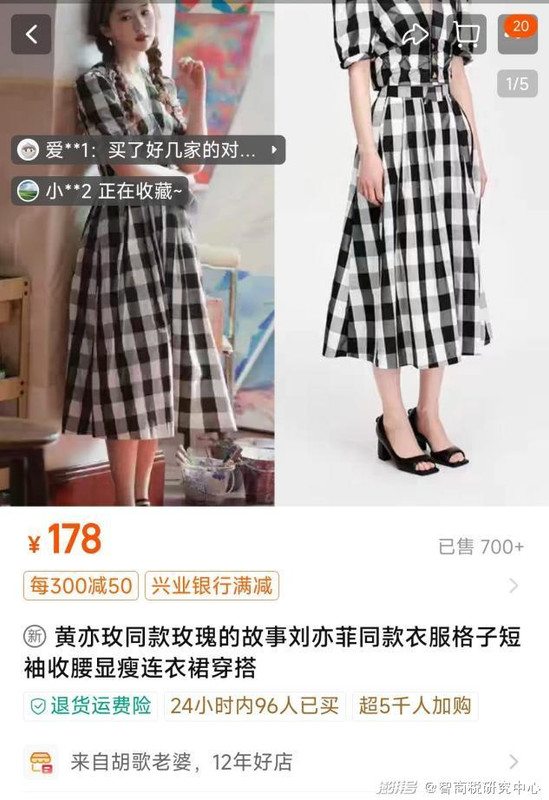 | More affordable fashion. On Taobao, this dress became a top-selling model, priced at 178 yuan per piece. More than 700 pieces have been sold, and more than 5,000 people have added it to their shopping carts. It is worth noting that the name of this store is "Hu Ge's Wife" :) In addition to Liu Yifei outfits copies, styles from those worn in the drama by Zhu Zhu, Wan Qian, Chen Yao, and Lan Yingying also appeared on Taobao's hot search list, becoming a reference for the audience's dressing. |
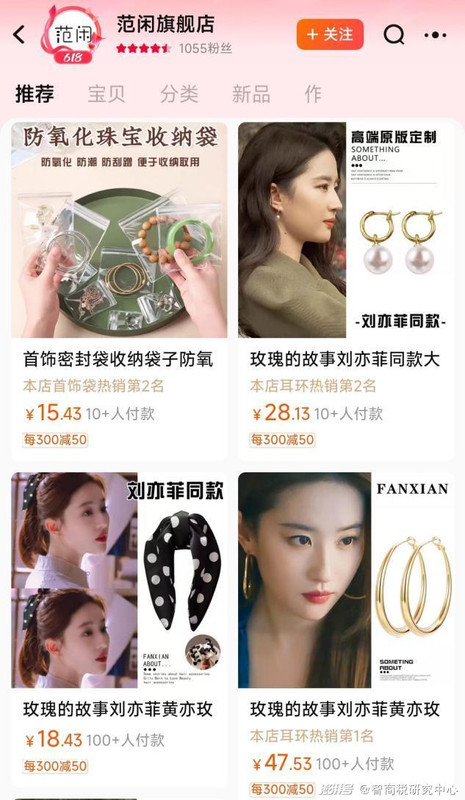 | "a pair of earrings that are the same as those worn by Huang Yimei in the drama were sold at a discounted price of around 47 yuan. More than 100 people bought them within a week. " The author of the article was amused that the name of this online store was "Fan Xian Flagship Store". (This is a fans of Joy of Life c-dramas insiders joke, since the second season of the story was top trending in May-June 2024, and the name Fan Xian has a very funny meaning : "范闲 in a lot of Southern dialects (e.g. Jiangsu dialects) sounds EXACTLY the same as the word 犯嫌 “being annoying”. "犯嫌死了 is often used to refer to things that are annoying"! :) |
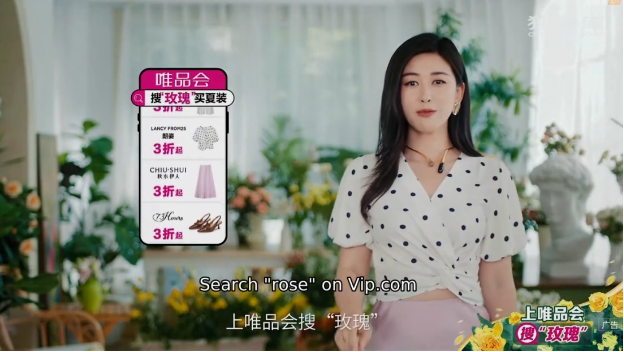 Ad for an online shop of ladies wear, in ep.35 Ad for an online shop of ladies wear, in ep.35 | Ladies wear, Tina's, Meigui's, Susu's etc. sometimes with "clever" reference to moments in the episode, might pop up like this one: "Welcome to your own Rose life. Anytime, Vipshop has sales on branded designs and surprises. To walk with the wind, just go with wide legged pants. Change to a glossy skirt. Elegance and ease." |
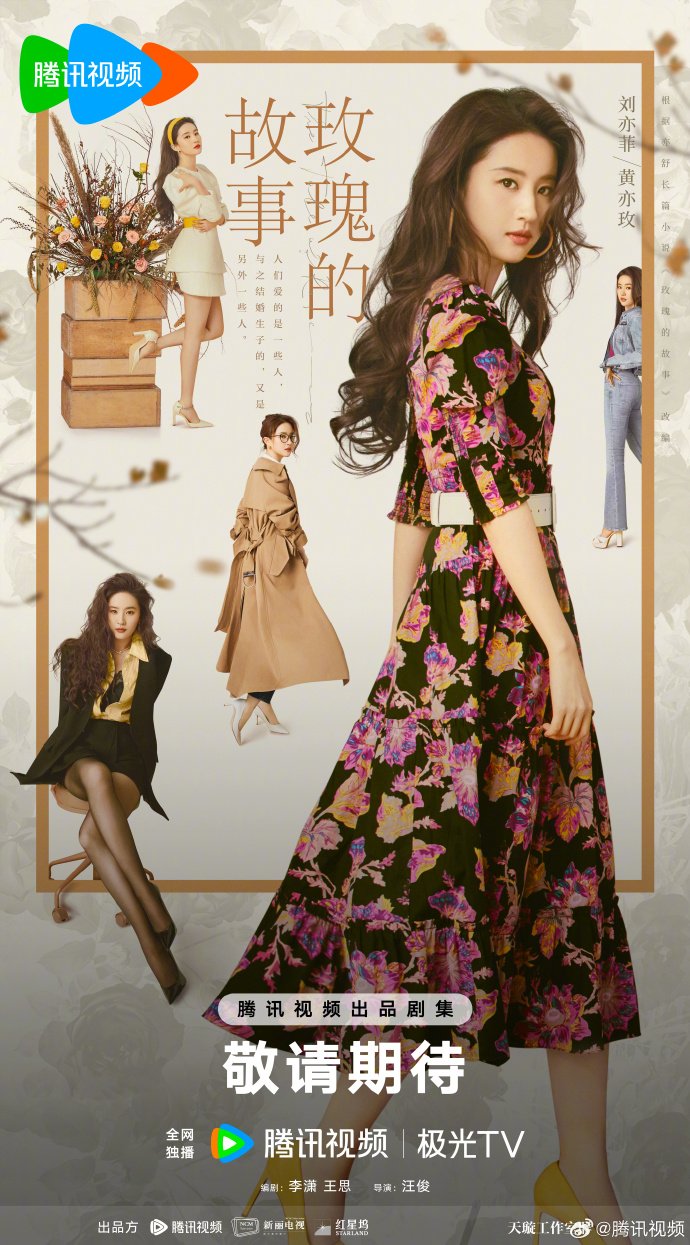 A YouTube short video (1'14) presents some of the looks of "Rose fashion" as fit for summer dressing. (Excerpts: Some pictures to right super imposing brands and shop names) DVF : Diane von Furstenberg is a Belgian-American fashion designer known for making luxury fashion wearable and accessible. | a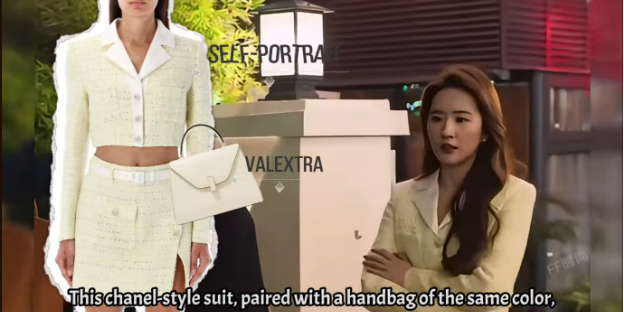 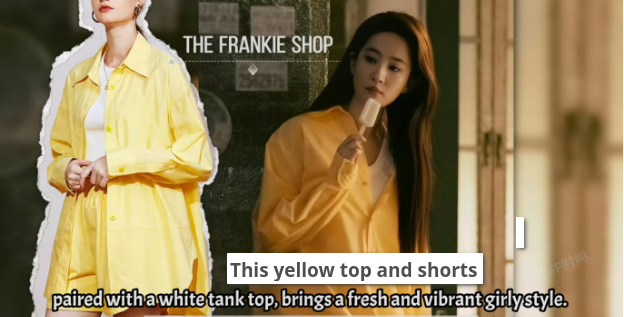 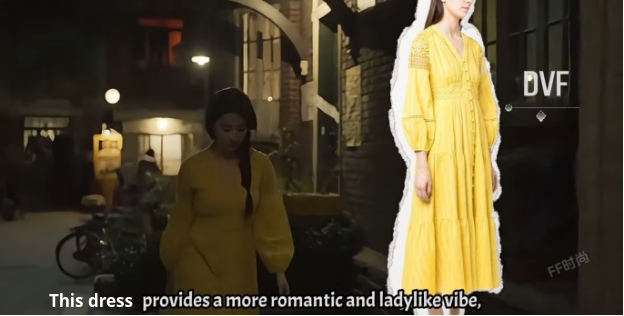 |
6. Cultural Notes |
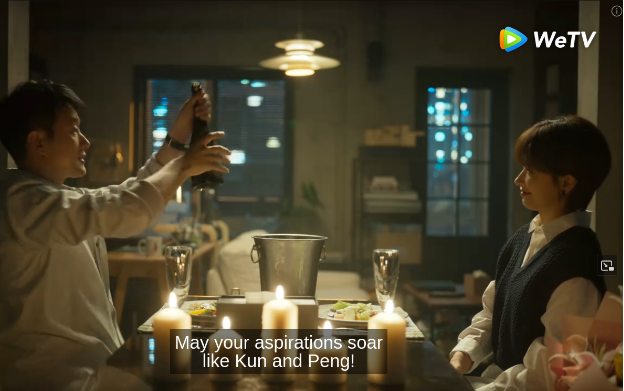 Huang Zhenhua celebrates SuSu's promotion as director of Cyan Art Gallery (ep.21) and wishes her : Huang Zhenhua celebrates SuSu's promotion as director of Cyan Art Gallery (ep.21) and wishes her :鲲鹏展翅 Kūnpéng zhǎnchì | ||
In the Daoist classic "Zhuangzi" 莊子 book, Kūn is described as a mythological creature in the Northern Sea whose size is immeasurably enormous. Kūn transforms into the giant bird, Péng 鹏 : "In the Northern Ocean there is a fish, the name of which is Kūn. I do not know how many thousand li in size. The Kūn changes into a bird with the name of Péng. I don't know how many thousand li in breadth its back is. When the bird rouses itself and flies, its wings obscures the sky like clouds. When on a voyage, this bird prepares to start for the Southern Ocean, the Celestial Lake." A 2018 account of an art performance at Yanqi Lake describes it thus : "Kūn Péng spirit is an embodiment of Chinese culture — one that puts the pursuit of moral integrity before one's mortal life; one that teaches "a truly benevolent person has no enemy." It is a spirit deeply rooted in the collective character of the Chinese nation." |
7. Cultural notes : the Korean ethnic group in the PRC |
(Info from Britannica, Wikipedia, Young Pioneer Tours, Andrei Lankov and other articles, linked)
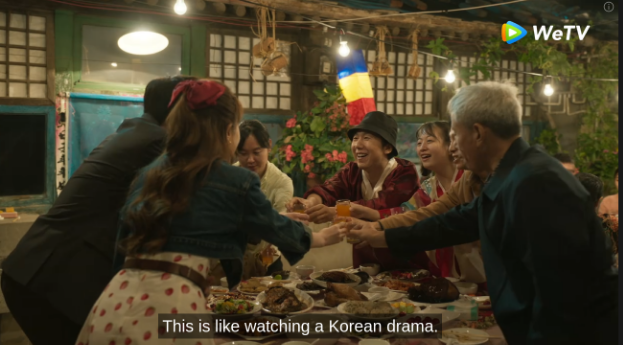 Huang Yimei travels with Fang Xiewen to his hometown in Yanbian Autonomous Korean Prefecture (ep.20) Fang Xiewen was of Korean whole or mixed ethnicity (the family name Fang is not an obviously Korean name, but alongside the 87.7% of Chinese ancestry with that name, there are 1.8% Korean who also have that name). In ep.13, at the beer house, he had mentioned to HYM that he was not from Shanghai, and that his hometown was Yanji. Huang Yimei travels with Fang Xiewen to his hometown in Yanbian Autonomous Korean Prefecture (ep.20) Fang Xiewen was of Korean whole or mixed ethnicity (the family name Fang is not an obviously Korean name, but alongside the 87.7% of Chinese ancestry with that name, there are 1.8% Korean who also have that name). In ep.13, at the beer house, he had mentioned to HYM that he was not from Shanghai, and that his hometown was Yanji.
Despite the geographical proximity of the countries, most Koreans who immigrated to China were historically absorbed by the Manchu, Mongol, or Chinese, so “the overwhelming majority of today's ethnic Korean population in China are descendants of recent Korean arrivals. " Many are descendants of those who fled famines in the 19th century or Japanese rule after 1910, or those who sided with the CPC during the Japanese invasion, or who were volunteers to defend the DPRK (North Korea) against the international coalition led by the USA in 1950.
The designation of an autonomous prefecture gives certain benefits to the ethnic groups there, such as education and legal processes in their languages, funding for culture promotion and the guarantee of certain positions in government for minority individuals : half of the government seats are reserved to Koreans In Yanbian and Changbai, and both Korean and Chinese languages are used while performing governmental duties, with Korean being the principal language used, along with encouraging the use of Korean in local primary and middle school. “A local law requires every street sign in the prefecture to be written in both Korean and Chinese, and it explicitly stipulates that Korean letters should not be smaller or placed below the Chinese characters. This even applies to advertisements.” (Lankov, 2007). Nevertheless, the spoken Korean language in use among the PRC Korean is different from the one used in South Korea (ROK) or in North Korea (DPRK) ; the ROK also has many different dialects, and the differences are big enough to sometimes make them unintelligible for other Korean dialect speakers. The Korean minority is generally well educated, they have a higher level of education than many other Chinese ethnic groups. Yanbian University located in Yanji city is a comprehensive university offering bachelor to doctoral degrees. The university is one of the Project 211 national key university and a member of the Double First Class University Plan. But despite being exempt from the "one child policy", ethnic Koreans have had a low fertilty rate. The Koreans' birth rate has always been lower than that of the Han Chinese. "In 2000, the average Korean woman in Yanbian had 1.01 births in her lifetime. This again reflects the higher education levels of the ethnic Koreans: better-educated groups tend to have less children." (Lankov, 2007) In September 1994, Yanbian Korean Autonomous Prefecture was selected by the State Council of the People's Republic of China as a "Model Autonomous Prefecture". Yanbian was the first autonomous prefecture in China to receive this title and it had continuously received this title five times. According to a 2012 University of North Carolina honors thesis, the Chaoxianzu are seen as a model minority and have good relations with both the Chinese government and Han majority.
Yanji city is 150 kilometres (247 miles) from Buxian Shan or Mt Paektu in Korean, which is of paramount importance in North Korean culture and lore. Yanji sits across the small Tumen river from a DPRK town, which used to be the second point of entry from the PRC into the DPRK (the first being Dandong, which has a railroad bridge connection between the countries). "Yanji is the principal commercial hub of the Yanbian Chaoxianzu Autonomous Prefecture and is a collecting point for local agricultural products. It is also an industrial centre of the region, with food- and timber-processing operations and factories manufacturing textiles, pharmaceuticals, electronic equipment, and electrical appliances as economic mainstays. Agricultural implements are also manufactured. There is a secondary industrial centre some 9 miles (15 km) to the south at Longjing, where there are machinery works, a power station, and a paper mill. "Since it is the capital of the autonomous prefecture, Yanji is also an important cultural centre for the ethnic Korean population, providing radio and newspaper services in Korean and maintaining extensive cultural and economic relationships with both North and South Korea. Yanbian University (founded 1949) is the largest institution of higher education in the city; over the years, several colleges and schools (including those for medicine, agriculture, and teacher training) have been merged into the university, which itself was reconstituted in 1996." (Britannica) Yanji is served by Yanji Airport. It is a small, regional airport that typically takes flights from nearby cities in the provinces of Jilin, Liaoning and Heilongjiang. However, your likely route into the city will be facilitated by the main Railway Station. Daily trains run from the provincial capital, Changchun, and can be attained for less than 100 RMB. Additionally, a sleeper train ticket from Beijing will usually cost less than 200 RMB. (Young Pioneers) Touristic villages."Yanbian Korean National Minority Folk Custom Garden (southwest of Yanji city) is a place that has actively sought to preserve its Korean heritage. The village is rather like stepping back in time to a period before the cold war radically changed both ‘official’ Koreas towards their respective blocs. The buildings are traditional, the clothing is traditional, the practices are traditional and you get the point. For those looking to get a brief glimpse into a Korea largely removed from its homeland over the decades of industrialization and conflict, this may be what you’re looking for. Hongqi village (红旗 in Antu county) offers a similar project. Located 140 kilometers away from Yanji and 150 kilometers away from Mt Paektu, this village has done a similar job at trying to preserve its traditional Korean nature, particularly in its architecture, cuisine and cultural practices." (Young Pioneers) Hongqi Korean Folk Village is located at Wanbao village, Antu county, Jilin province and known as the No 1 Korean folk village in China. Hongqi Village is also near the main way leading to the Changbai Mountain, a well-known tourist destination in Northeast China.
Distrust and cultural or political tensions.For most Chinese Koreans, the Chinese nationality is just a legal status and Korea is an ambiguous entity that often makes nostalgic appeals to historical and cultural heritage. Most of us are just too busy to think about grand historical or nationalistic rhetorics—we’re just common people busy making life better for our family and ourselves. (Hyunwoo Kim on Quora)But there is an ambiguous or negative relationship between Chinese and Koreans from across the border. Despite the help lent to the DPRK and the friendship displays at the annual mass games in Pyongyang, the Chinese have not forgotten that after the armistice, the DPRK chose to side with the USSR until its collapse in 1989, and the DPRK grudgingly accepted help during the subsequent severe famine caused by natural catastrophes. The PRC also feels annoyed at the embarrassment of having to deal with a small nation that manages to appear as a threat to the world with its nuclear armament, and necessitating diplomatic contortions to comply with demands (mostly spearheaded by US politicians) that China keep the "buffer state" in check. The PRC resents being asked to be their "brother's keeper" when the ties are not wholehearted. The DPRK is used to perform excesses such as its seasonal tests of missiles (scaring the few foreign residents who live and work there enough to hurry for evacuations! although the more cool-headed downplay the threats). The DPRK also innovates with provocations as tit-for-tat when the ROK sends airborne leaflets or loudspeaker messages of anti DPRK propaganda (latest instance is the DPRK sending balloons raining rubbish and refuse over the border). Besides, the DPRK Koreans are even more haughty than the ROK ones : they believe in ethnic purity and despise mixed marriages, which their breakaway refugees often have to accept in China. In addition the North Koreans are also reputed to deal with drugs and human trafficking, when they don't worm their way roundabout to seek shelter with nations that have an agenda to accept them as mouthpieces against their northern neighbors. The antagonism is also strong between the Chinese and the South Koreans, despite the success of Korean fashion, popular culture, K-pop and K-dramas. The Chinese consider that the Koreans have an arrogant mentality : they generally display a condescending attitude when facing the Chinese and Chinese information. 20-30 years ago, the Chinese chose to endure it because they needed South Korea's capital, investment and technology (the same goes for other developed countries). However, in the past 20 years, China's economy has grown rapidly. The economic level of the eastern region has been comparable to that of South Korea, and it far exceeds South Korea in terms of scale. Chinese literary and artistic works and fashion elements have gradually surpassed South Korea. -- In Confucianism, "the golden mean" is a key moral quality. Confucius urged the Chinese people to "not be arrogant when they are rich, and not to feel inferior when they are poor." The Korean people's characteristic of "becoming proud as soon as they become rich" happens to fall in the worst range of China's moral values. The Chinese resent the cultural appropriation by the Koreans of anything from Chinese festivals, cultural artifacts, clothing, even legendary figures such as Confucius or Li Bai. There have also been several instances of political rifts that have left scars (listed on Wikipedia) It goes back to the Korean traitors who abetted Japanese invasion of China in the 1930s and supported the Japanese occupation of their home country where many were reduced to slavery by the Japanese, and Korean "comfort women" were used by the Japanese soldiers. The ajumma tight curls hairdo for mature women dates back to that era... Chinese people will hardly mention anything positive about South Korea. Most Chinese people think South Korea is useless. This sentiment eased somewhat during the Park Geun-hye years, but has since gotten worse. “ After the 2000s it became almost a love-hate relationship, with Chinese young people who had gone to train in K-pop groups often returning with mixed feelings, after a few years, sometimes with legal suits to break the unreasonable contracts imposed on them (Exo-M members) and feeling that they had been discriminated and looked down on when they lived in Korea. "In addition, South Korea's capital and technology are outdated in the eyes of the Chinese. They were unwilling to tolerate this kind of attitude from Koreans anymore, so they turned this mentality into contempt for South Korea." (Aya Shawn, Quora)
|
HYM met her future mother in law for first time, and a number of relatives, including one "sister" dressed in Hanbok (Korean dress). HYM dived rashly into this different culture without preparation, in the three days they took off for their project to marry with minimum fuss. The mother-in-law and Huang Yimei's own father and brother were very critical (albeit for very different reasons) about this "shotgun marriage" that was in fact not justified by more than Fan's insecurity and jealousy about Yimei's former lover, just returned from France. It felt as though Huang Yimei traveled to another country ! The people spoke a language she did not understand, despite the Korean phrasebook she took along and the help with interpreting that her husband-to-be readily gave her. They had decided to forgo a formal wedding, so the first meeting with Fan’s family was part betrothal, part wedding dinner thrown into one, in rushed way, to the annoyance of Fan’s mom, who did not appreciate the “Beijing girl, not used to home making” and resented the low yield of red envelope gifts from relatives. To add to her annoyance, she was asked by FXW to hand over a fat envelope to her daughter in law (he provided the money, but the mom hoped it was to cover the dinner expenses). The couple was only going to register marriage in his birth town in Yanbian Korean Autonomous Prefecture, not even spending a few days for honeymooning in the famous mountains. Cultural and other distrust piled up from start between the Chinese Korean ethnic mom and HYM. | ||
KOREAN WEDDINGSFrom the description below (copied from a selection of websites, linked), we can see that Huang Yimei and Fang Xiewen's mixed marriage broke traditions not only from excessive haste. The results was a mix of Chinese modern marriage banquet with extended family attending and Chinese decorations of "double happiness" characters, and getting money gifts in red envelopes like for the New Year festival. "In Korean tradition, the marriage in itself is not the union of two persons but the union of two families. Many Korean wedding customs reflect this unity of families and demonstrate respect for parents. Taking into account this concept, it’s easier to understand such Korean traditions as matchmaking, an engagement celebration before the official wedding, the Korean bowing for parents, and the Paebaek ceremony." (Sergey Green) When attending a Korean wedding, cash is usually brought as a gift. Similar to other cultures, the amount given varies depending on the social status of the gift-giver and their relationship to the bride and groom. 01 of 10 Hanbok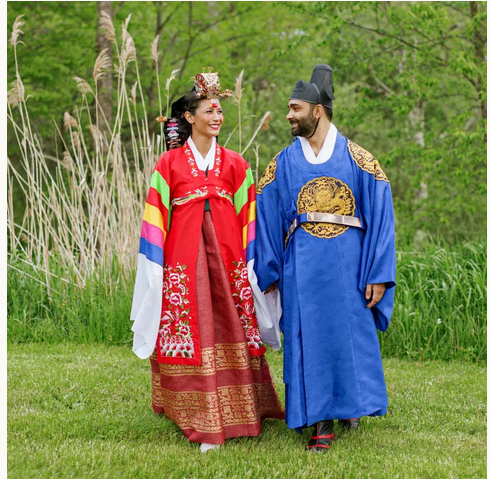 Photo by Flora & Fauna Korean brides will most likely wear hanbok, or Korean traditional formal clothing, historically made of silk, while the groom may wear hanbok or a suit. During the paebaek and the formal Korean traditional wedding, a bride may choose to wear a wonsam, an intricate upper garment embroidered with designs in silk thread, along with a full skirt called a chima. A less formal but still traditional bride wears the chima and a jeogori, a long-sleeved upper garment that is generally shorter and cropped higher compared to the wonsam. The more formal groom or a groom attending a paebaek wears a samogwandae, the court attire of the Chosun Dynasty. His attire consists of a long, elaborate robe-like vestment on top of pants and a jacket, along with a belt and a headpiece called a samo, a black cap with wings on the sides. The less formal groom might opt to simply wear pants called baji and a jacket called a jeogori. +Note : "A Korean bride will surely expect a ring for her engagement. However, in South Korea, there are no strict rules to wear on an engagement ring or even a marriage ring. Many older couples don’t wear wedding bands and young Korean couples wear rings, although they are not married at all. Korean couples’ rings can be a sign of being in a committed relationship or it can be a gift for a memorable couple event."
Luxury Gift ExchangesIn the past, grooms would provide a "hahm" before the ceremony, which refers to "the groom's family's gift to the bride," explains wedding planner MJ Seo. "It is often presented before the wedding ceremony as a symbol of the groom's sincerity and commitment. The 'hahm' typically consists of various items, including money, jewelry, or other valuable gifts." She continues by sharing. "The act of presenting the 'hahm' is a meaningful gesture that showcases the groom's appreciation for the bride and signifies his readiness to take on the responsibilities of marriage. The "hahm" tradition isn't commonly practiced today, and most modern Korean weddings have substituted luxury gift exchanges by both families. This can include items such as designer goods, jewelry, or other high-end presents, symbolizing the union of two families through the celebration of love and prosperity." 03 of 10Specific Colors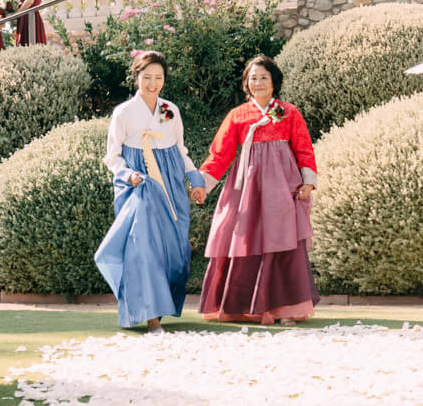 Processional ParadeBefore the traditional ceremony begins, couples will engage in a processional parade where traditional Korean music will play. Historically, the groom would parade to the bride’s house on a horse, but now, an officiant will enter and begin to explain the wedding, guiding the audience through the sequence of events. The two mothers will then walk in first, each with their own candles; the bride’s mother carries a red candle and the groom's mother carries a blue candle. Just like the red and blue clothing, these two colors symbolize the balance of cosmic forces that occur in nature. When the mother reaches the end of the processional, they light one single candle, symbolizing the beginning of the Korean traditional wedding. 05 of 10Explanation of the Table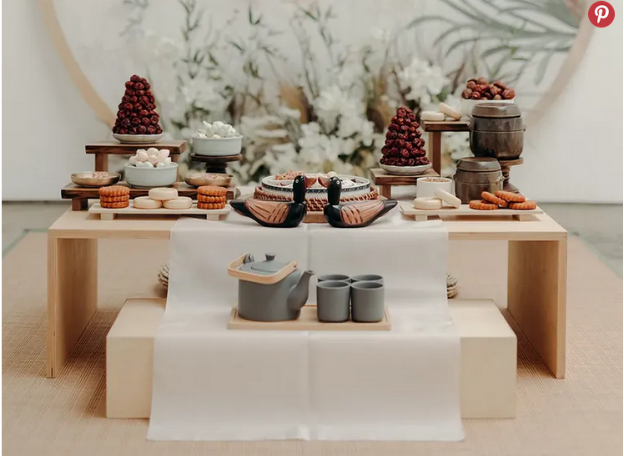 After the processional parade, the officiant will then begin to explain the contents on the table, which include Mandarin-style wooden ducks (won-ang seteu), pinecones, bamboo, dates, chestnuts, persimmons, red beans, gourd cups, and a copper bowl. The copper bowl is for the handwashing of the couple to symbolize their cleansing and purity for one another. Pinecones and bamboo represent loyalty for life, while dates and chestnuts represent fertility and how many children the couple will have. The newlyweds eat at their table and then greet the guests table by table. It’s important to greet every guest and express gratitude for coming. At the end of the banquet, the couple is solemnly seen off. The party in Western-style with drinking and dancing may occur later in the evening, with just the couple and friends going out on the town. 06 of 10Jeonanyrye
Jeonanyrye is the “presentation of the wild goose." Historically, the groom would gift a wild goose to his mother-in-law to symbolize his commitment to his new wife, showing he would be loyal to her for life just like geese, which mate for life. In modern times, the groom’s family will gift wooden ducks to the bride's family. 07 of 10GyobaeryeHapgeunryeHapgeunrye is the time when the bride and groom will drink from the same copper cup. Either the couple will drink from two separate halves of a gourd connected by a thread, from the same cup, or from a combination of both. The halves of the gourd symbolize that the pair are becoming one whole entity. In one tradition, the first sip from the copper cup represents the couple’s relationship with one another. The second sip is taken from the gourd cups, which are switched between the bride and groom after the second sip to represent an interchange. Finally, the couple bow together to show respect—to their parents, their ancestors, and their wedding guests. +Note : "The highlight of the ceremony is when the couple share jung jong (Korean wine) together. The bride and groom sip the wine from their separate cups and then the wine is mixed together, poured once more into the cups and it's sipped again. This is their wedding vow, the kunbere," explains Shim. 09 of 10Paebaek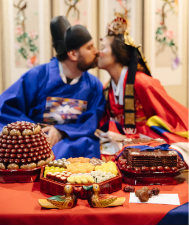 Paebaek is one of the most important moments of the Korean traditional wedding, emphasizing the importance of family to Koreans. Historically, only the groom’s parents would be with the bride and the groom for the paebaek, but now both sets of parents are invited. This was previously only a private ceremony for those family members, but now, many modern couples hold the ceremony during a cocktail reception hour so that all guests can view the paebaek; this means the special moment can also be photographed. Paebaek is one of the most important moments of the Korean traditional wedding, emphasizing the importance of family to Koreans. Historically, only the groom’s parents would be with the bride and the groom for the paebaek, but now both sets of parents are invited. This was previously only a private ceremony for those family members, but now, many modern couples hold the ceremony during a cocktail reception hour so that all guests can view the paebaek; this means the special moment can also be photographed.Both sets of parents sit behind a low table full of food from the original wedding ceremony table. Nowadays, families try to incorporate as much food as possible on the table to make it look lush, but it was traditionally only three platters of food: a tower of chestnuts and dates, flat beef jerky, and a third platter of eight little appetizers called anju. +Note :The parents of the groom take their places at a low table decorated with special food. The Pyebaek table setting usually has three items: a pile of dates connected with a red thread, a pile of beef jerky tied with red and blue yarns, and a bottle of distilled liquor. This food symbolizes yang, the positive of the two forces of ancient Oriental philosophy. The number of dishes must total an odd number which will bring good luck and prosperity for the new marriage.
Post-Ceremony MealAccording to Seo, "Traditional Korean weddings often involve a symbolic ceremony attended by close family and friends. After the ceremony, guests typically proceed to the dining room to enjoy the meal, and the event concludes. Seo adds, "Many couples choose to host their weddings at hotels or specialized wedding venues, where the culinary experience often blends..., creating a fusion of flavors. In the case of buffet-style weddings, there tends to be a diverse selection of Korean dishes alongside other international options. Examples of dishes served at such weddings may include Galbi (Grilled Short Ribs), Samgyetang (Ginseng Chicken Soup), Haemul Pajeon (Seafood Pancake), Bulgogi (Marinated Grilled Beef), Japchae (Stir-Fried Glass Noodles), and more. These dishes represent a harmonious blend of traditional Korean flavors with modern presentation styles, offering a delightful and culturally rich experience for wedding guests." Traditional Korean Wedding Food, Drinks and Desserts
|
8. Airplanes and flying in China |

  "On August 10, the 200th Sunward SA60L (Aurora) aircraft was delivered at the Sunward Aviation Industry Base in Zhuzhou. The SA60L (Aurora) light sports aircraft project was approved in 2002, and it has taken 18 years for Sunward to deliver the 100th aircraft in 2020. However, it took only 23 months between 2020 and 2022 to complete the delivery of the second 100 Aurora aircrafts. Sunward now has 115 domestic customer units which are distributed in 28 provinces, municipalities, and autonomous regions across China. It is way ahead in terms of the domestic market share of the same type of aircraft and the number of flight hours."  Flying BTS with Lin Yi reading from script Flying BTS with Lin Yi reading from script (ep38) First time flying on the training plane for HYM and for Taichu. (ep38) First time flying on the training plane for HYM and for Taichu. | 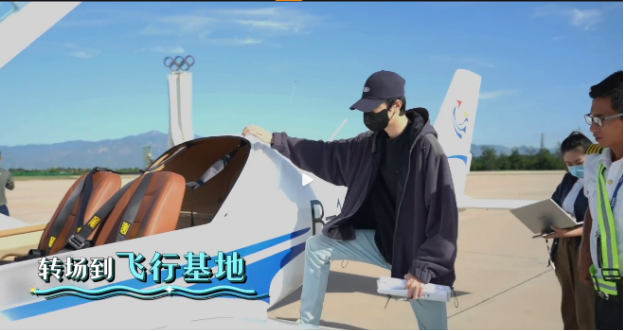 Although it is not common to learn to fly for a Private Pilot license, in China, it is indeed possible, from Gaokao (entrance to university exam) and age 18, but because of the expense, the students usually enroll in view of a career in civil or military aviation. Although it is not common to learn to fly for a Private Pilot license, in China, it is indeed possible, from Gaokao (entrance to university exam) and age 18, but because of the expense, the students usually enroll in view of a career in civil or military aviation.The plane used by He Xi and Huang Yimei in last episodes 38 and supplement cuts 39 was easily identifiable by its true registration number B-12NC: it was a Sunward plane operated by Huayuan Aviation School - Beijing Badaling ZBDL located in the Badaling Great Wall area, north of Beijing. They operate about 10 helicopters and 30 small planes, and have their own airstrip. There are other flying clubs such as the Falcon Flying Club which operates nearby in Miyun Mijayu airport among other locations. The plane was a Sunward SA60L Aurora, frequently used as training plane across China. It is "a Chinese light-sport aircraft, designed and produced by Sunward Aircraft, a division of Hunan Science and Technologies Co Ltd, an industrial machine manufacturer located in the Lu Gu High Technology Development Zone. The aircraft is intended to be supplied as a complete ready-to-fly-aircraft." The CAAC (Civil Aviation Administration of China) granted the design a type design approval in mid-2013. It is a 1 crew+1 passenger plane, 1 propeller plane with 1,200 km (750 mi, 650 nmi) range and 4,000 m (13,000 ft) service ceiling. |
COMMERCIAL AIRPORTS IN Beijing and Terminal 2(episode 38)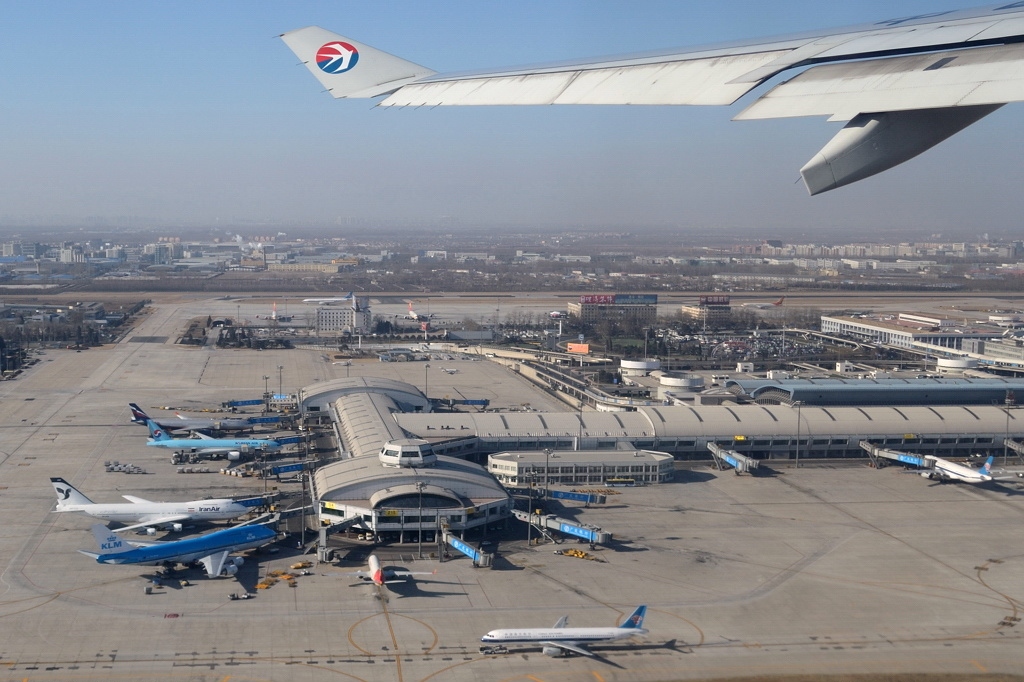 T2, Departure hall, view from take off, Airbusn China Eastern Airlines, in 2010 (Wikipedia, pictures link to sources) T2, Departure hall, view from take off, Airbusn China Eastern Airlines, in 2010 (Wikipedia, pictures link to sources)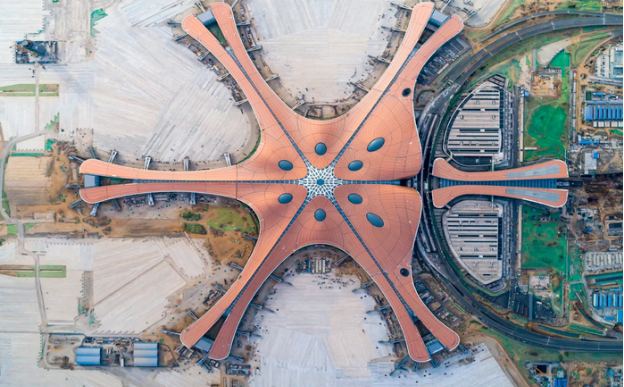 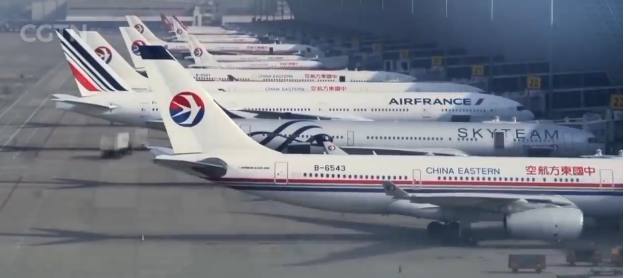 _NEU.jpg) 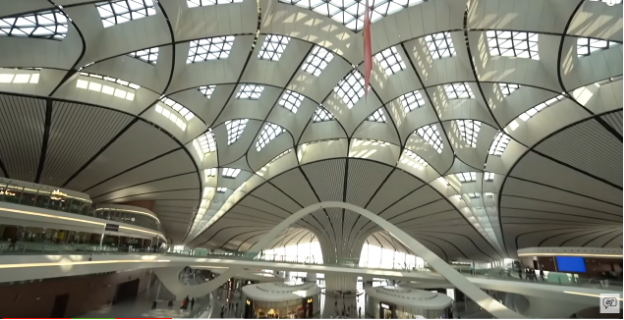 Inside China’s New $17 Billion Mega Airport - Beijing Daxing (Youtube, Nov 2019, 15'49 ) - Below: Daxing International airport (CGTN, Youtube, Sept.25, 2019, 3'46) Inside China’s New $17 Billion Mega Airport - Beijing Daxing (Youtube, Nov 2019, 15'49 ) - Below: Daxing International airport (CGTN, Youtube, Sept.25, 2019, 3'46)  | Capital Airport"Beijing International Capital airport" (IATA airport code PEK), some 30 km northeast of Beijing comprises 3 terminals: Historic terminal 1 operated from March 1958 to 1999, and was renovated to reopen in September 2004 to handle Guangdong based China Southern Airlines domestic and international flights. In the 1990s air traffic had grown exponentially and the runways were too few and congested, so new terminals were rapidly added, still too few to handle traffic without congestion, even without problems with weather (fog, storms) or pollution. Two new terminals were added, one close by, the other a little further away, still in the extension area of urban Chaoyang district, 30 some km away from city center. They were linked to the Beijing Metro system by a light rail rapid transit line, and to the 4th and 5th ring-roads by highway. Terminal 2, opened 1999, serves certain lines, including Air Koryo (DPRK/Pyongyang in North Korea) and some members of Skyteam (notice the counter with that name that the three pilots are walking by in ep38). Skyteam is one of the three major global airline alliances. It includes 19 carriers among which international KLM, Air France, Alitalia , Aeroflot, Korean Air, Delta Air Lines, Aeroméxico , and domestic Chinese carriers: China Eastern Airlines, Shanghai Airlines, Hainan Airlines, Xiamen Airlines. Terminal 3 operational since March 2008 was designed to handle the surge in air traffic caused by the Beijing Olympics. A little further away north eastfrom T2, it looks like a turtle and a Y . With its very big size, the "turtle" like front and Y extension also houses an immense commercial concourse and "food city". It continues to serve over 27 airlines including Singapore Airlines, Qantas, and Star Alliance, Oneworld alliance, and Air China. Daxing AirportToday, since 2019, an even bigger airport 46 km south of the capital, "Daxing" .became the Beijing home of China Eastern Airlines, China Southern Airlines, and China United Airlines, The airport, designed by Zaha Hadid Architectes, looks like a six pointed starfish or a "phoenix in flight". The airport was planned to be able to handle "120 to 200 million passengers a year, which, if capacity were fully used, would make it the world's busiest airport by passenger traffic". It allows 258 (and up to 300) flights to take off or land in an hour, Many airlines alliances have relocated there, and the new airport serves both Beijing, 46 km away, Tianjin, and Lanfang in Hebei province through rapid underground transit rail, buses, highways. "Compact, as one of the world’s largest airports, there are 79 gates spread across the five aircraft piers. The radial design means that the largest number of aircraft can be parked at the piers, while also still providing a quick and convenient journey for passengers to the central area. "As well as being aesthetically pleasing, the airport also incorporates renewable energy sources. Solar panels provide power for the building, while a rainwater collection and water management system is also included. The water management system uses nearby wetlands, lakes and streams to store and purify the water and prevent flooding of the surrounding areas. The heating uses a ground-source heat pump as well as a waste heat recovery system to provide efficient and eco-friendly heating. " |
9. ROSE AND ART |
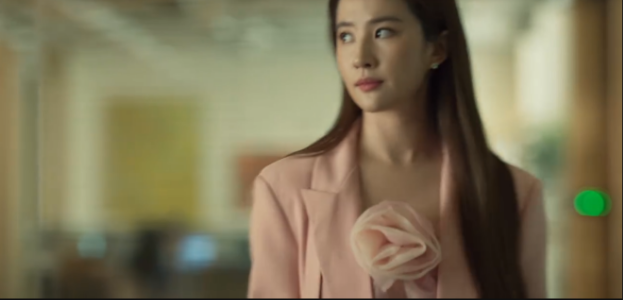 (ep.2) Huang Yimei's first suit at her job interviews : powder rose suit with a big matching fabric ribbon rose decoration. The rose evokes the ones that crowned Frida Kahlo, the Mexican painter who did 55 self portraits, among which were several with rose crowns, or other, such as the self portrait with thorns and hummingburd from 1940, a copy of which hangs in HYM's bedroom :
(ep.2) Huang Yimei's first suit at her job interviews : powder rose suit with a big matching fabric ribbon rose decoration. The rose evokes the ones that crowned Frida Kahlo, the Mexican painter who did 55 self portraits, among which were several with rose crowns, or other, such as the self portrait with thorns and hummingburd from 1940, a copy of which hangs in HYM's bedroom :
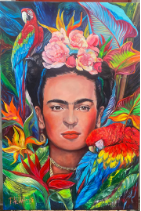 | 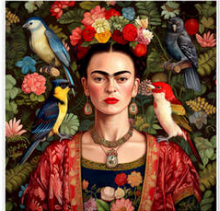 | 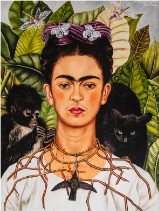 |
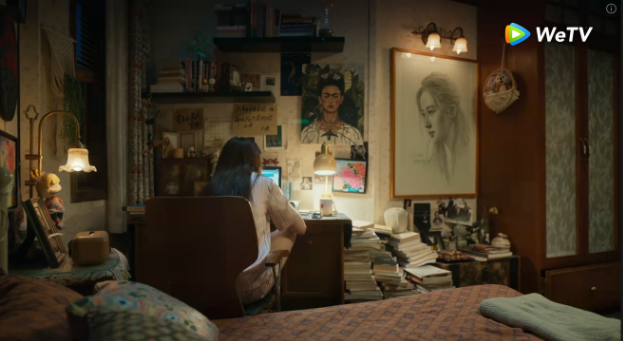 (ep2) Huang Yimei's bedroom with her own self portrait and that of Frida Kahlo, an anti conformist painter who had to make use of extreme courage to overcome the lifelong pain and medical problems caused by a bus accident she suffered when she was 18 years old.
(ep2) Huang Yimei's bedroom with her own self portrait and that of Frida Kahlo, an anti conformist painter who had to make use of extreme courage to overcome the lifelong pain and medical problems caused by a bus accident she suffered when she was 18 years old.
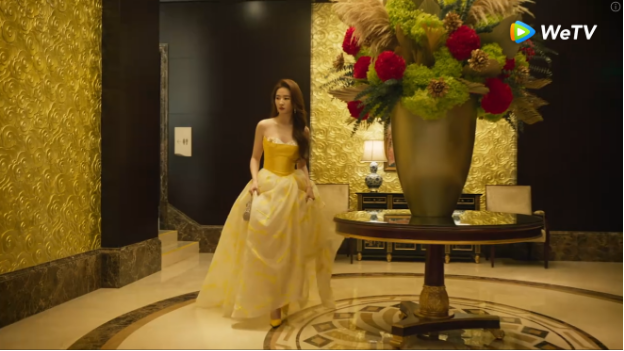 | 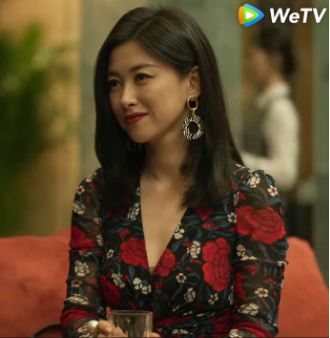 |
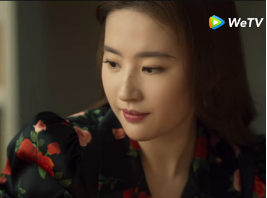 | 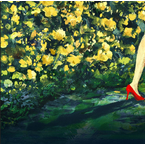 |
(ep3) Meigui crashed the doors to a private party in China World Hotel (a top Beijing CBD venue) and called her boss Tina (Jiang Xueqiong) to meet with the French art exhibition organizer, who Zhuang Guodong (Eric) was acquainted with. The red roses printed on Tina's dress mirrored interestingly those in the oversize gold vase that Meigui had been walking by, and Meigui's own blouse with rose and rosebud prints (ep.2).
| 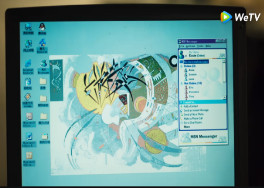 (ep10) HYM's computer wallpaper and MSN messenger list, with abstract and colorful design. (ep10) HYM's computer wallpaper and MSN messenger list, with abstract and colorful design. |
 (ep.14) Going to an art exhibition for the first time, Fang Xiewen was taking many notes, and specially, when Huang Yimei compared the color scheme in one painting to those used by Georgio Morandi. (" Italian painter and printmaker who specialized in still lifes. His paintings are noted for their tonal subtlety in depicting simple subjects, mainly vases, bottles, bowls, flowers, and landscapes.") The particular landscape hanging in the drama is unknown, unrecognized by Google Images ; it is supposed to be part of an exhibition of European and American paintings.
(ep.14) Going to an art exhibition for the first time, Fang Xiewen was taking many notes, and specially, when Huang Yimei compared the color scheme in one painting to those used by Georgio Morandi. (" Italian painter and printmaker who specialized in still lifes. His paintings are noted for their tonal subtlety in depicting simple subjects, mainly vases, bottles, bowls, flowers, and landscapes.") The particular landscape hanging in the drama is unknown, unrecognized by Google Images ; it is supposed to be part of an exhibition of European and American paintings.
 Paesaggio, 1943 Paesaggio, 1943oil on canvas, 34 x 52 cm "Through his simple and repetitive motifs and economical use of color, value, and surface, Morandi became a prescient and important forerunner of Minimalism. " Click on pictures for links to credits and more info. |  Natura morta, 1943 Natura morta, 1943oil on canvas, 36 x 45 cm  Morandi's studio, Via Fondazza, Bologna, 1981 Morandi's studio, Via Fondazza, Bologna, 1981 |
| (Ep14) Moving in. Huang Yimei gave a gift of a hand made vase to Fang Xiewen, who was touched by the gesture: he did know that Morandi also was fond of still lives with vases. |  |
Fang Xiewen had taken notes on all the artists she had mentioned : Konstantinovich (one of the greatest masters of marine art), Mondrian (his famous primary colored rectangles and lines paintings are famous and influenced fashion in the mid 20th century until today) , Shigeko Kubota (a video and sculpture installation artist of the 1960s Fluxus movement, who also was a feminist)... Despite it was not his field and core interest, FXW took it to heart to expand his knowledge, and decide how these data could be applied, in his computer scientist's approach to life.
 | 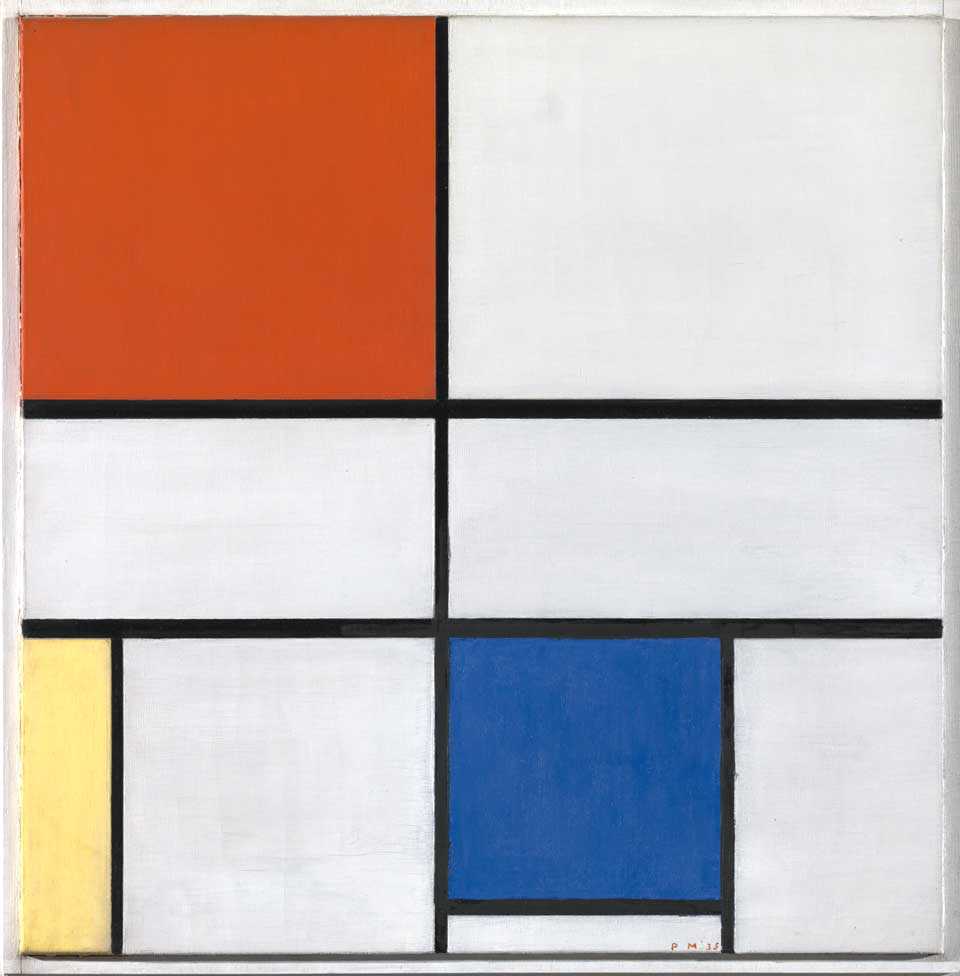 |  |
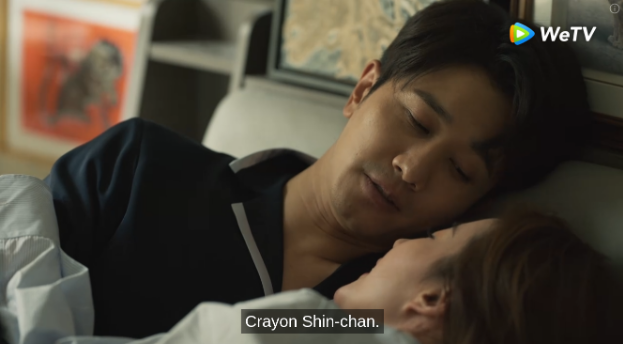 (ep7) (ep7)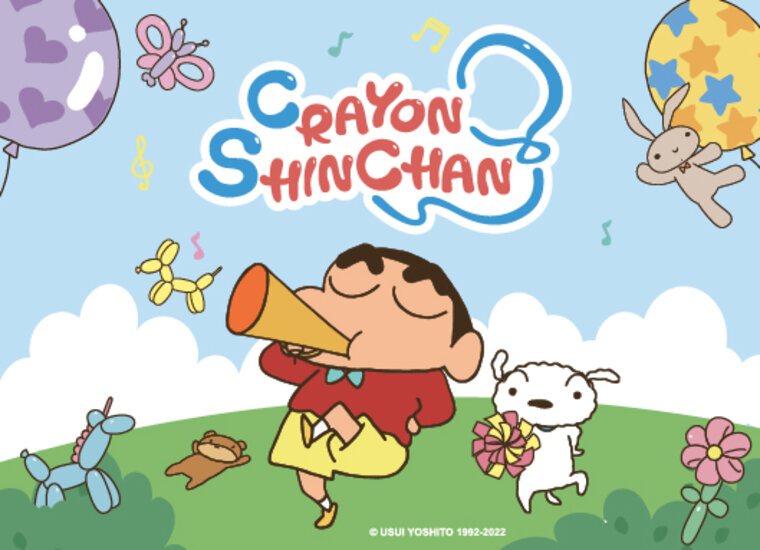 | Other references : Once they got back together, ZGD and HYM had a guessing game. ZGD guessed that Meigui was thinking about a character in a famous manga/anime, called Crayon Shin-Chan. "Crayon Shin-Chan is a cartoon by Japanese cartoonist Yoshito Usui, who said that only happy people can spread happiness. Don't think of Crayon Shin-Chan as some kind of ignorant kid. In fact, he has his own unique ideas. For example, he likes a beautiful sister, adopts a stray dog, and often tells ridiculous dirty jokes... The author of "Crayon Shin-Chan" takes the vision of a 5-year-old child, a 40-year-old adult mentality to observe the world; whereby the audience also can experience life." |
 (ep13) Hu Kejia, autistic child painter (ep13) Hu Kejia, autistic child painter (ep13) The charity exhibition - Tina was happy and purchased some pieces. (ep13) The charity exhibition - Tina was happy and purchased some pieces. 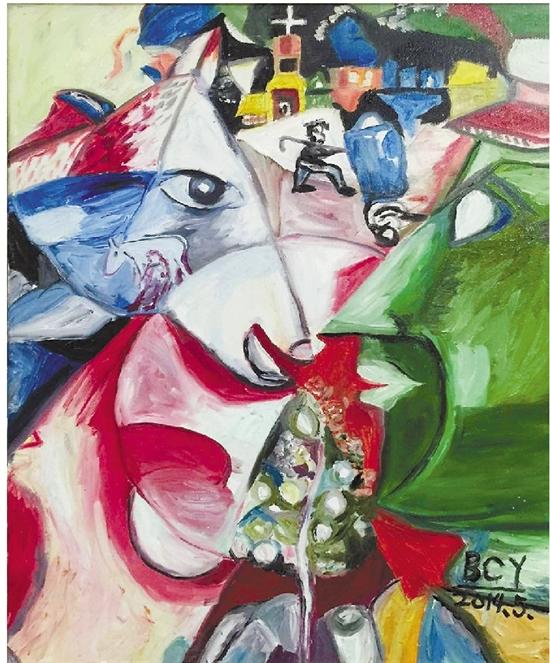 A piece of work by Bi Changyu. [Photo/Chengdu Business Daily] A piece of work by Bi Changyu. [Photo/Chengdu Business Daily] | On her return from Paris, Meigui decided to take up the task of setting up a charity exhibition of the art of Hu Kejia, a young autistic painter genius. She suggested the Cyan gallery use their office and lobby space ; Tina approved and it was decided that this would become an annual event. The experience caused her to want to explore a new branch of learning : psychology, and to do a thesis on Art therapy. In fact, autistic painters are not few. An artcle from China Daily of 2024-05-29 centered on a real life Zhu Yuchen, now 24 years old, and commented : "In China, autistic children are often referred to as "children of the stars" because, although they may be physically close to us, their minds seem distant, as if they are on another planet. Autism is a spectrum of characteristics, not a disease. They are people living on this planet. Just like everyone else, they are unique individuals." Zhu's parents sent Zhu Yuchen to drawing classes when he was 12. In April, Zhu created five paintings of cats for the "Painters From the Stars" event to commemorate World Autism Awareness Day on April 2. - In 2015, China Daily reported that autistic painter, Bi Changyu, 19 years old, had been labeled "Chinese Picasso" for his paintings by renowned Chinese painter Chen Danqing in 2011. |
10. THOUGHTS ABOUT THE SYMBOLISM |
This part is about Huang Yimei and her successive loves. But the secondary story of her brother and his own romantic relationship also captured audience interest, so let's start with that.
ZHENHUA, Bai Xiaohe and SUSU | Episodes focusing on Meigui's brother finding himself infatuated with SuSu until she accepted him were compiled by a Youtuber in a 1h12 movie edition (click on link to view) |
 (ep19) Steamed fish and beer (13:10) (ep19) Steamed fish and beer (13:10) |  (ep19) completing the recipe (ep19) completing the recipe |
HUANG ZHENHUA - There is certainly also much that could be said about the symbolism in her brother's relationship with Bai Xiaohe (the fishing is such a huge one !) and with SuSu (who was trapped in murky water horror memories). One is too shallow and elusive despite the promise of her job (she was studying towards a PhD in Chemistry), like a fish that escapes the hook and does not like to engage with men, so she chose another way to fulfill her own vague wish of motherhood. She was the first to cause Huang Zhenhua to get his foot hurt (what a symbol!)
 (ep6) starting on wrong footing (20:49) (ep6) starting on wrong footing (20:49) |  (ep9) Dumbbells (sequence from 13:12) (ep9) Dumbbells (sequence from 13:12) |
Sū Gēngshēng 苏更生 was the vice director of the art gallery who hired Huang Yimei (Meigui , Rose) who was the first to nickname her new friend and colleague " Sūsū". Usually, Chinese nicknames are formed from the given name and not like in this case, the family name Sū. But since that nickname evokes a historical artist (Xuē Sùsù 薛素素, a famous Ming dynasty female poet and painter whose landscapes, portraits, and birds and flowers paintings can be admired in several museums across the world) and Sùsù 簌簌 is a girl's name that means "slight sound", perfect for one who is calm and quiet, with discretion qualities, and 苏醒 Sūxǐng a word which means "to awaken, regain consciousness", the nickname is appropriate, but more for familiarity, as the two women grow to be best friends and eventually, sisters in law.
Su Gengsheng dealt with her burdens through running and body building, managing to cause Huang Zhenhua to hurt his feet twice (the dumbbells she sold to him dropped on his foot, he got hurt again later by hot water scalding his foot). Huang Zhenhua, felt they were not really a match, having started on the wrong footing (yes) with her, when he berated her for making Meigui do overtime. But he slowly grew to think more and more about SuSu. The apparently rigid woman was nowhere like the indifferent Xiaohe: she was in fact warm and caring, needing someone who would not judge her, but come to her side, both as exercising partner, and emotional support. Huang Zhenhua sometimes meddled, not understanding the deep roots of her insecurity, causing potential rifts (the bathtub issue, the money that should never land in the hands of SuSu's mother). Communication and counseling resolved some issues and they eventually married sometime after HZH became an uncle, and after a while, although they were older than Taichu's mom and da, they produced a "Little Pudding" of their own. Both Huang Zhenhua and Su Gengsheng were like a strong and dependable lattice that supported the Meigui's growth along the events of the drama.
| MEIGUI - Colors certainly play a large role in this drama about an artist. Yellow comes to mind at first since it is part of her identity, embedded in her Huang family name. Yellow symbolizes imperial power, but also the bright sun radiating, tying in to her careless and free upbringing in a learned family. Her bright yellow dress used to crash gates at a private art party in view of furthering her goals to thrive in the art circle were just a disguise, and she actually resented offerings of yellow roses as love tokens, when the color should have been only that of friendship. A Youtuber compiled the episodes from opening of the drama and the unacceptable sudden suitor until the meaningful thought about relationships and art expressed by Meigui's dad, into a 1h01 movie edition (click on link to view) |
 (ep2) Zhou Shihui's proposal bouquet (ep2) Zhou Shihui's proposal bouquet |  (ep6) ZGD's make-up bunch of roses (ep6) ZGD's make-up bunch of roses |
The bunch of roses brought to her at the Art Academy by her first suitor, Zhou Shihui (who had run away from marriage with Guan Zhizhi in ep1) and the one sent to her office by Zhuang Guodong when he was trying to apologize for the slight he had inflicted on Meigui, were both rejected by HYM. -
 |  |
(ep3) When Meigui crashed the doors to a private party in China World Hotel (a top Beijing CBD venue) as a cross of Alice in Wonderland daring explorer of oversize places with huge roses, she wore a Sun color dress evoking the French tale of Peau d'Ane, where the heroine transforms from modest maid into a beautiful princess - a variation on Cinderella or Ye Xian tale, but without the emphasis on shoes (Meigui did bring matching yellow shoes). But she always felt ambiguous about that dress, which she used as a sort of cosplaying disguise, only twice.
The red roses printed on Tina's dress mirrored interestingly those in the oversize gold vase that Meigui had been walking by. Meigui was going to enter a world of passionate love, following in the footsteps of her boss and mentor, whom she later discovered also was a passionate person with a love and soulmate interest that ultimately mirrored the one in Meigui's life.
The vines of vision and meaning were already intertwining and taking roots to make the first passionate love story bloom.
ROSES SYMBOLISM AND USES-Roses symbolize love, royalty, beauty, sensuality, secrecy, and mysticism. They are also associated with achievement and perfection.
In Chinese, three flowers are translated to "rose" : 蔷薇 qiáng wēi , 月季 yuèjì, and méiguì 玫瑰 : the first is the rambler rose, wild rose, multiflora ; the second is the "Chinese rose" and the third is one that also has multiple medicinal uses beyond ornament. The rose was one of the most valued medicinal plants in the monastery gardens of Medieval Europe. Rose petals are very astringent, making them excellent for washing skin and bruises. Roses are also classically considered a strong aphrodisiac and antidepressant. The Persians are credited with the development of rose oil. In Traditional Chinese Medicine, Rosa chinensis, is used to Regulate Qi, Reduce Stagnation, and nourish the skin, and improve digestion. It is related to the Earth and Wood elements of the Spleen and Liver Systems. History/Folklore: Roses are an ancient symbol of love and beauty, with “rose” translating to the words “pink” or “red” in many languages. The rose was sacred to the goddess Isis, Aphrodite, and Venus (goddesses of love and beauty). The rose is often called the King of Flowers.
In the West some symbolism by colors (click on picture to view a clearer linked chart) More :
|
Symbolic interpretation from the drama - vlees commented : "I noticed a pattern of roses being used in different stages of Rose’s life: Colors sometimes are distorted by memory and rational thinking putting "order" into them. The roses painted on the wall of ZGD rooms were pink, there were red ones in a frame. Roses could be seen in vases, bottles, or paintings in Meigui's room during her time with Fang Xiewen... |
The notes below may seem somewhat spoilerish, so best to read them after having watched the drama, although they just offer a view and explanation for some events that can be interpreted differently : Fang's character was difficult and the control he exerted was borderline toxic, but he still stayed human enough to change path when he realized he was on the wrong one. Similarly, Meigui had chosen sentiments over reality, and her trying different checks and balance to grow caused herself and other men, other people around her, much pain, just as expected from a thorny flower.
FIRST LOVE("torrid affair") -Tender pink and rose red Rose | The episodes have been compiled by a Youtuber into a 2 hr movie edition of meeting Zhuang Guodong (ZGD) until making the relationship public + a 2hr17 movie edition of living free love until breakup (click on highlighted links to watch them) |
 (ep8) Red roses on the wall in ZGD apartment. (ep8) Red roses on the wall in ZGD apartment.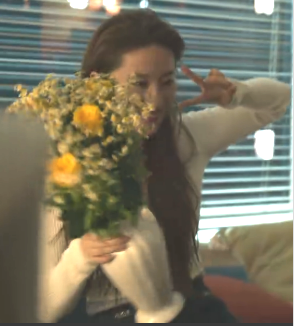 (ep8) Yellow roses in a bouquet when Meigui thought ZGD was going to meet her parents and take her on honeymoon to Paris. (ep8) Yellow roses in a bouquet when Meigui thought ZGD was going to meet her parents and take her on honeymoon to Paris.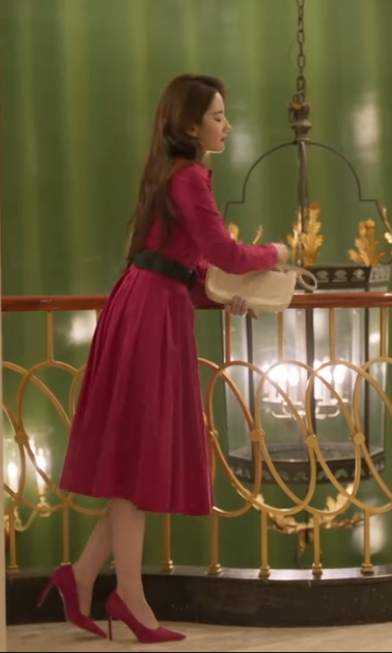 (ep10) The fuchsia pink dress of still passionate love when she was in Shanghai and ZGD had moved to Paris. (ep10) The fuchsia pink dress of still passionate love when she was in Shanghai and ZGD had moved to Paris.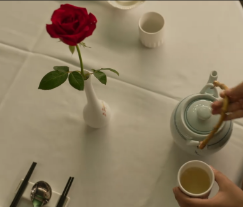 (ep20) Red rose on the table of the restaurant where Zhuang Guodong took Huang Yimei to dinner, in Shanghai. (ep20) Red rose on the table of the restaurant where Zhuang Guodong took Huang Yimei to dinner, in Shanghai. |  (ep8) In her anguish at discovering that instead of meeting her parents, ZGD intended to expatriate, Meigui had a drunk nightmare of dancing, and trashed the apartment. 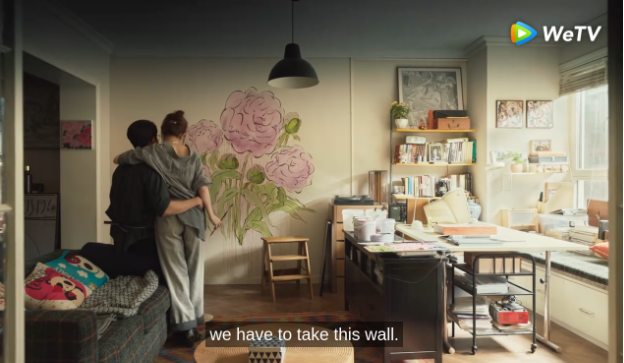 (ep9) Meigui compensated her wild trashing of ZGD's apartment by painting the damage over with an original flower composition. (ep9) Meigui compensated her wild trashing of ZGD's apartment by painting the damage over with an original flower composition. ZGD reflected that this precious gift ought to be taken with them if they ever moved. But he did not keep his promises, and was too complacent in thinking Meigui would not mind leaving her parents and country to follow him abroad, and wait for him when he had no time for her. Ultimately, Zhuang Guodong viewed Meigui as pretty furniture that he could use when he was in town, although he admitted that what she wanted was : respect (ep07). But he was not going to give her equal or more respect than what he had for his mother, despite he was aware of that mom's flaws and the hurt she deliberately inflicted on Meigui, when she pushed forward a young woman she liked in her son's direction while Meigui, who had traveled to see ZGD in Paris, was watching. The next day, Meigui left Paris, despairing that her relationship with her fisrt passion would ever come back on tracks as before. They had had too many clashes, and this was the slight too many.
|
SECOND LOVE("marriage") peach rose in the shadows of the clay walls | The episodes from Meigui in Shanghai, being pursued by Fang Xiewen for whom she is his first love and goddess, marrying him and finally revealing her past have been compiled into a 1h52 movie edition . |
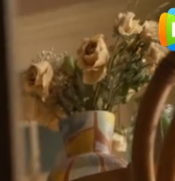 (ep.16) half wilted roses (ep.16) half wilted roses
The dried peach roses were moved in the bedroom, to the left side of the bed.
| (ep16) catching Diu.
Meanwhile, Huang Yimei was slowly healing from her breakup with Zhuang Guodong, and appreciating the security.
But Fang Xiewen's controlling and domineering nature grew over time to the point of suffocating her, like a vine growing too tight around the rose, and taking away the sun from it. Meigui was bereaved and threw up when she got home from her dinner with ZGD, and FXW got so concerned that he sleuthed clues and evidence about who she had been with, but without confronting her directly about it. Next, he laid out all that he had to give to her and proposed ; she accepted and they traveled to Yanji to marry (ep.20 - see also section7). In fact, later, when FXW came to gloat at him with a box of wedding candies, Fang told him that when ZGD left Yanji, Fang and Meigui had not yet signed at the Public Affairs marriage bureau... ZGD, disgusted, had a meal of Meigui's favorite dishes packed for her ; Fang after his first impulse to throw the pack away, brought it home on second thought without telling her who had paid for it. Not long after, she announced she was pregnant (ep.21). Fang Xiewen grew paranoid about radiation emitted by copiers, computers, and phones (it was indeed a much discussed subject in the late 1990s-early 2000s) that could hurt Meigui and the baby. He did not stop her from working outside before she fainted and he got scared about her health as the doctor started talking about a possible pre-eclampsia (ep.22). But his solution to keep her fed and secure, resigning her job without her agreement, and calling in his mom instead of a potentially less reliable maid, turned HYM's life into a "high security prison". She could not escape before delivery of her daughter, and even after, since FXW doted on the baby, annoyed at his mother who criticized expenses for "just a girl" and had caused a clash about her antiquated views on epidural and birth pains (ep24). The Korean mom, despite being offered more money by her son, soon traveled back home, feeling unappreciated and misplaced in Shanghai.
In early 2009, Meigui earned her certification as teacher, and they celebrated Taichu's 3rd birthday in the new home in Xihui, totally streamlined and modern, with a large room filled with toys for the little girl (ep25). But Meigui was disillusioned : there were no plants in the new home and her husband insisted on keeping her home and wanting a son. Fang Xiewen frowned on anything that took the mind of Meigui away from home, and developed a suspicious mind, overthinking when she wore skirts for a job interview or nail polish : he feared he was losing her and despite never being physically violent, he let unfortunate words slip that he looked down on her contribution and just wanted her obedience. Meigui and Xiewen were too different, and he could not make her happy ; his mistakes caused scars and hurt, so she finally broke free when one action too many from him caused her to lose the love she still held on to. She set the rules down for their consensual divorce, after having saved his life. They still had to go through some discussions, before they finally agreed that they would co-parent their daughter. To preserve at least some friendship with her, once she reassured him that she did not hate him, he even extended the benefit of his resources to her, so she could find a specialist to treat her next love. |
THIRD LOVE("soulmate") reblooming lavender-violet rose | A Youtuber compiled the story of Fu Jiaming with Rose until Jiaming gets hospitalized. (1h12) |
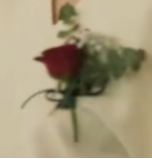 The red rose boutonniere worn by the guests at the gallery's opening ceremony. The red rose boutonniere worn by the guests at the gallery's opening ceremony.
|  (ep28) At the Vine Art "Man Man" gallery opening, there were floral displays and the guests wore red roses pinned to dresses or lapels. Eric (Zhuang Guodong) who could not come had sent a basket of pale yellow roses. Huang Zhenhua looked at his phone and explained to Fu Jiaming the reason for his sister's absence. (ep28) At the Vine Art "Man Man" gallery opening, there were floral displays and the guests wore red roses pinned to dresses or lapels. Eric (Zhuang Guodong) who could not come had sent a basket of pale yellow roses. Huang Zhenhua looked at his phone and explained to Fu Jiaming the reason for his sister's absence. Fu Jiaming was fascinated by Meigui's "hide-and-seek" concealed chamber in the art gallery, and the painting she had left in it. He added music to it, and Meigui loved it. She had found a soulmate, who could complement her thoughts about art and art curation. The gallery agreed to let Jiaming compose music for a selection of exhibited works while he and and Rose embarked on a fiery affair. But Jiaming had a weakness, which at first had made Rose think he was a pervert. He needed a certain molecule to keep his heart working, because of congenital disease. At the wedding party of his brother, he over-exerted and collapsed, had to be brought to hospital... After realizing he really could not get Meigui back as before, Fang just let her have all the support he could give her. He took care of their beloved daughter when Meigui needed time to try a last examination that Fang had arranged with a top medical authority. But Meigui's and Jiamin's hopes were squashed. They realized a final dream of his, climbing a mountain, before he composed his last pieces for the artwork in the gallery.
Fang did not gloat, just stayed aside, taking care of his daughter in Shanghai when the family was mourning in Beijing, but he accepted that Taichu and Meigui shuttled from then on between the two homes, and Taichu's wish to continue her schooling in Beijing instead of in an international school in Shanghai (Meigui was surprised at the suggestion, knowing how much he distrusted people going abroad and "returnees"). He purchased a new apartment in Beijing to be closer to Meigui and Taichu when he had to travel there, and hoped to give the key to Meigui, but she asked him to give it to Taichu instead, since their girl was already big. Fang had expanded his company and realized his professional goal, ever surprised and admiring his Rose's resilience, even when she was no longer his in title.
|
FOURTH LOVE("freedom and lightness") impossible blue-steel rose | More friendship or sisterly love than a last affair... A Youtuber compiled the episodes from Jiaming's death until Rose learned about He Xi's difficulties (1h12) |
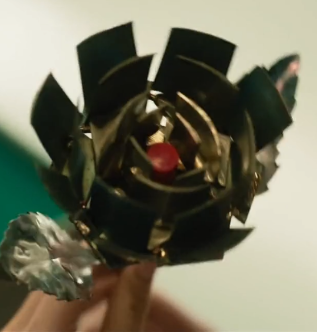 The steel rose : He Xi's parting gift to HYM, made from old airplane parts, before he flew away for further training as CAAC pilot. The steel rose : He Xi's parting gift to HYM, made from old airplane parts, before he flew away for further training as CAAC pilot. |
 (ep38) Huang Yimei had a meaningful conversation about age, with He Xi,the young 22 years old pilot. (ep38) Huang Yimei had a meaningful conversation about age, with He Xi,the young 22 years old pilot. He Xi, who had met Meigui too late, over the thrills of motorcycling and flying lessons, realized that their age difference was a problem, and that he needed to have a career before he could express his feelings for Meigui, and she felt more motherly towards him than really romantic. She still accepted his unusual "love token" of a hand made steel rose, that tied in with her views on art. The steel rose symbolized aptly her strengths, the evergreen color leaves or petals emphasized the uniqueness and strength of that abstract flower, and the red "heart" button seemed like an invitation and promise to fly again, growing skywards. But just before He Xi left, there was a moment, when Meigui's mental state proved to still bear the scars caused by her first trauma of Zhuang's leaving. She... hallucinated that He Xi was abandoning her : her mind played a trick on her :  She was perhaps having a nightmare ; she was dressed differently when she said goodbye to her protégé, shortly after in the series, in Beijing Capital airport Terminal 2 (see Flying). At 24, He Xi was launching on a new path in life, and Meigui on another, with no attachment. Or perhaps they would meet again someday. |

Back to Table of Contents Completed June 26-27, 2024
Last revision July 12, 2024
Recent Discussions
-
Last Japanese song you listened to? #23 minutes ago - martinkadp
-
Last Asian Song You Listened To?6 minutes ago - Wildflower
-
BL Drama Lovers Club19 minutes ago - Theo
-
RATE the KPop singer above you......37 minutes ago - Benizakura
-
Waiting comments1 hour ago - dramadayalldayy
-
Waiting comments- us clowns unite??1 hour ago - dramadayalldayy
-
Last NON Asian Movie you watched? #21 hour ago - onigen
Hottest Discussions
-
RATE the KPop singer above you......37 minutes ago
-
The ALPHABET Game [drama /movie version]3 hours ago
-
Word Association #42 hours ago
-
Drama Association Game2 hours ago
-
Yeah, no, guess2 hours ago
-
♥️Count to 7000000♥️39 minutes ago



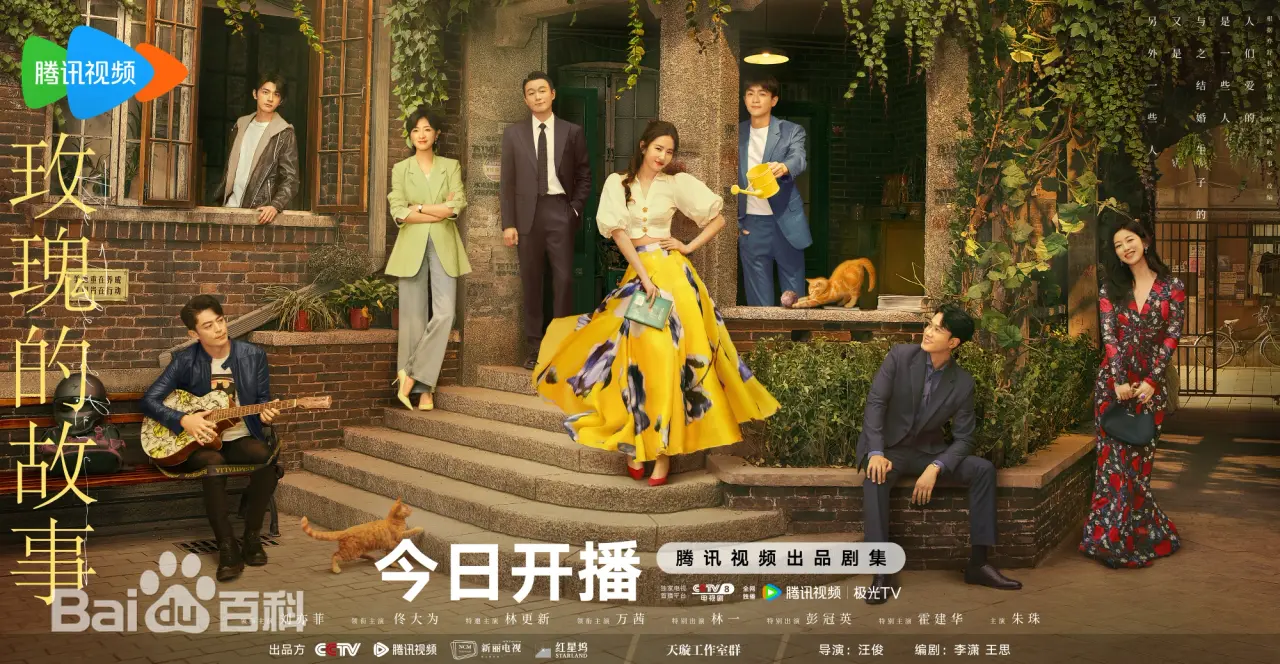
 see 5.4
see 5.4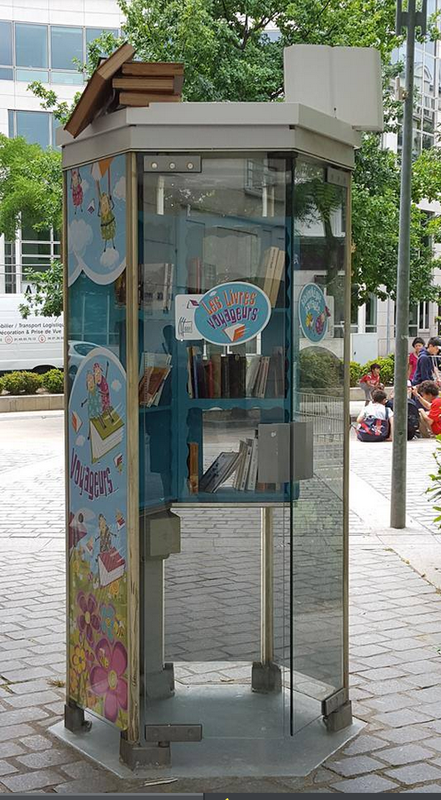


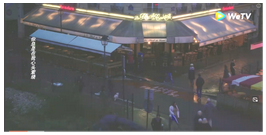
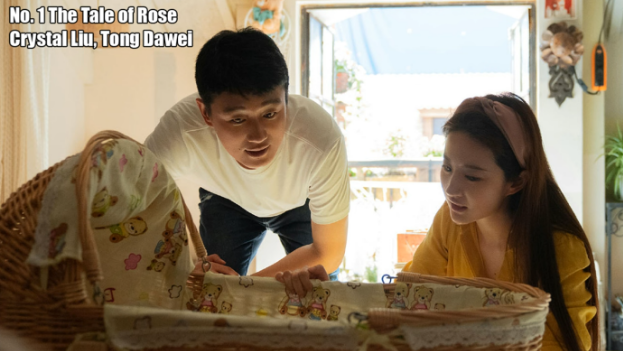 # 1 (week ending June 16) with 607 points
# 1 (week ending June 16) with 607 points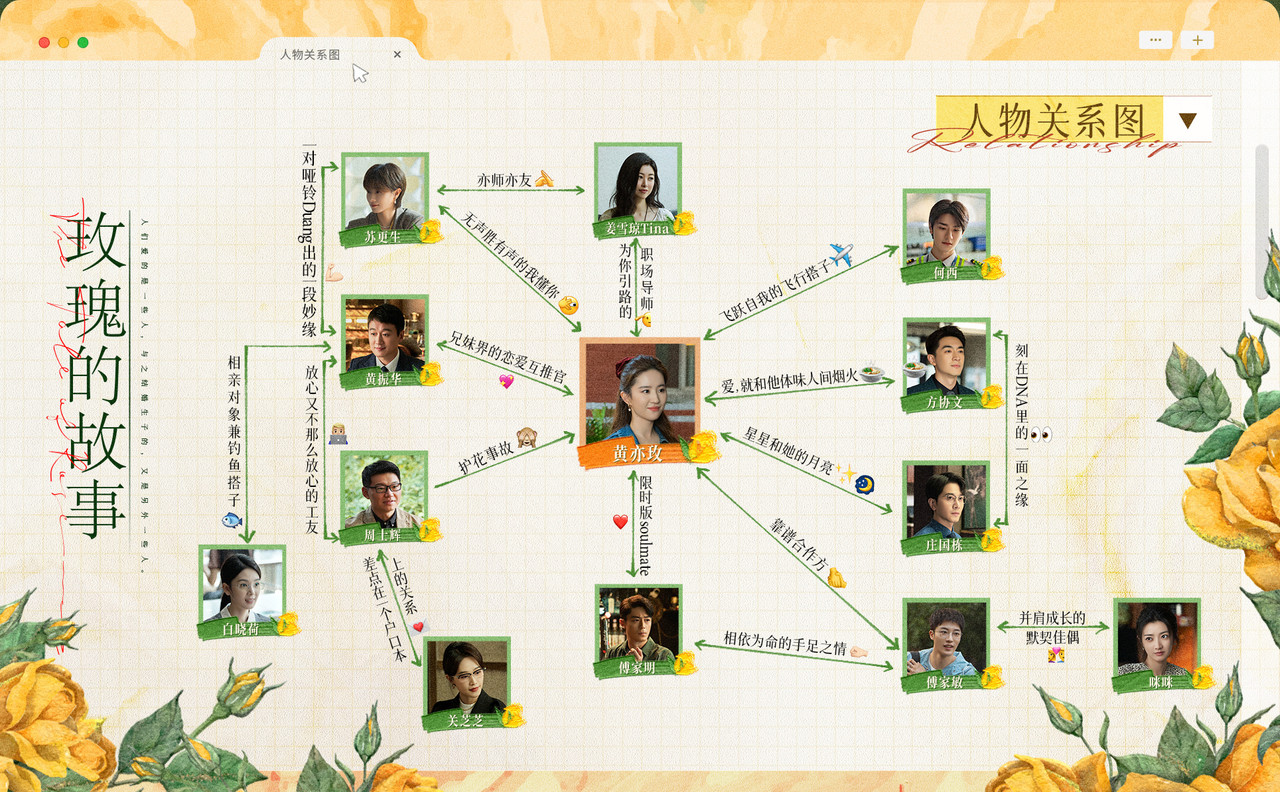
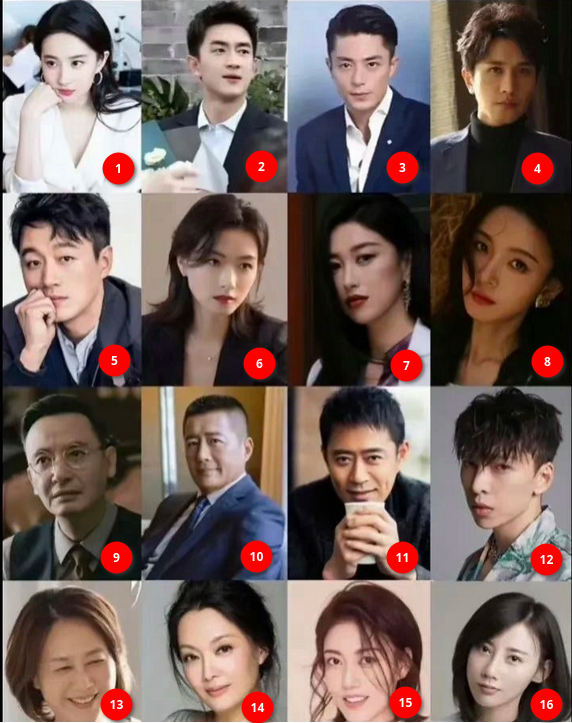

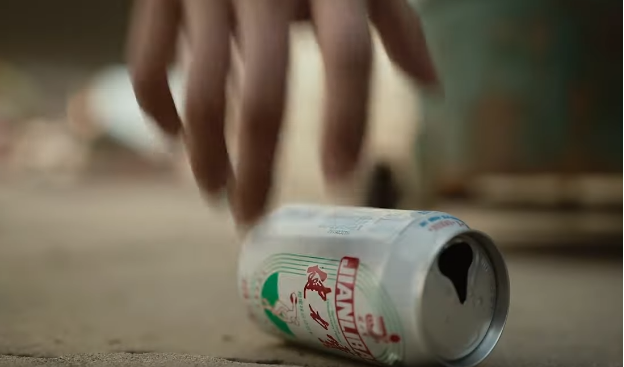
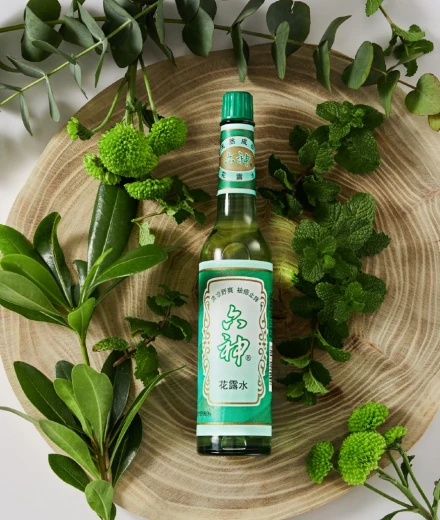

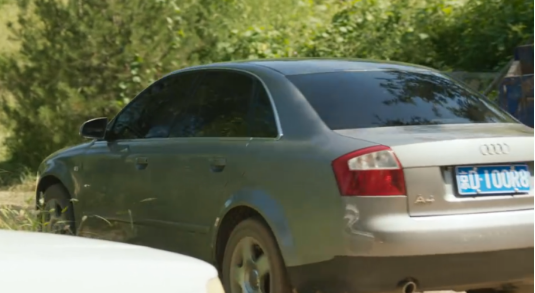
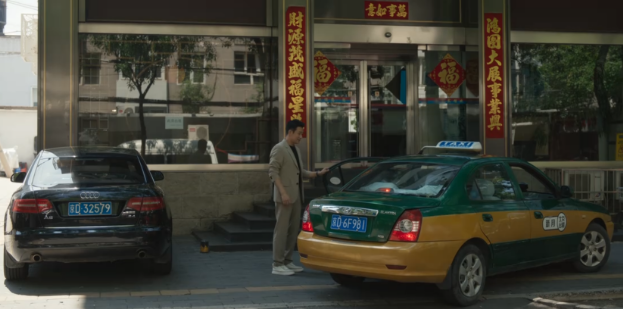 (ep30) "Drama edition number plate京D fof Huang Zhenhua's Audi car
(ep30) "Drama edition number plate京D fof Huang Zhenhua's Audi car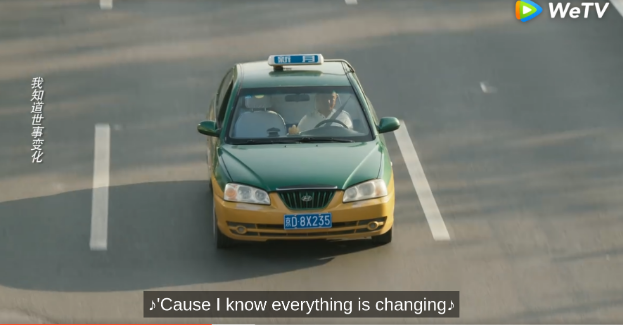 (ep29) "Drama edition Beijing taxi" used by Meigui to drive to the newly opened Vineart "ManMan" gallery.
(ep29) "Drama edition Beijing taxi" used by Meigui to drive to the newly opened Vineart "ManMan" gallery.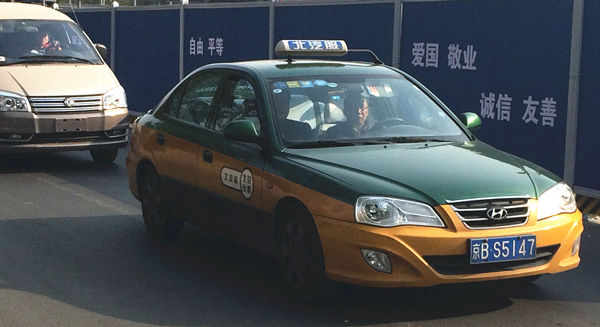 Real Beijing taxi and article on
Real Beijing taxi and article on 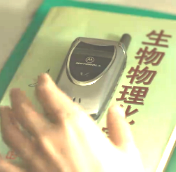
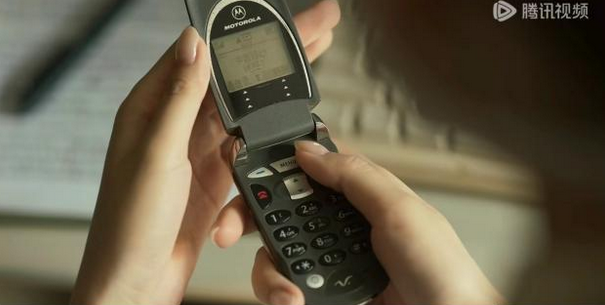

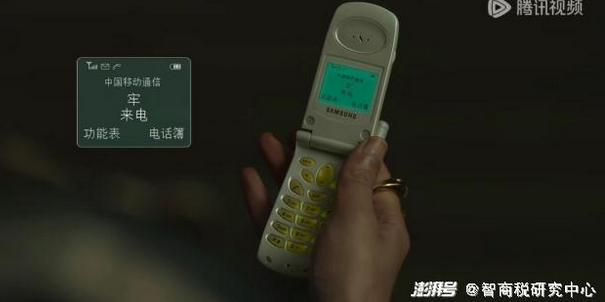 Su Gengsheng ("SuSu", Huang Yimei's colleague and friend) used first an old Motorola mobile flip phone with protruding antenna (ep.10), before switching to a Samsung A288 flip phone.
Su Gengsheng ("SuSu", Huang Yimei's colleague and friend) used first an old Motorola mobile flip phone with protruding antenna (ep.10), before switching to a Samsung A288 flip phone.
 (ep9) Zhuang Guodong received a job offer from France and communicated with his mom Song Jiaqi (played by
(ep9) Zhuang Guodong received a job offer from France and communicated with his mom Song Jiaqi (played by 


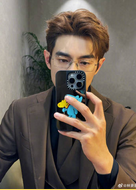
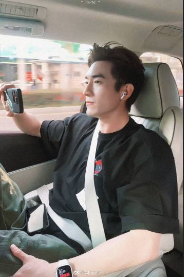
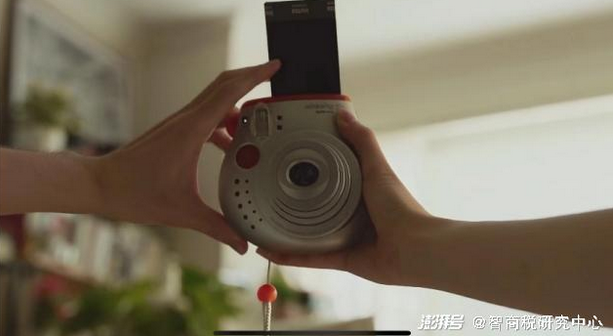
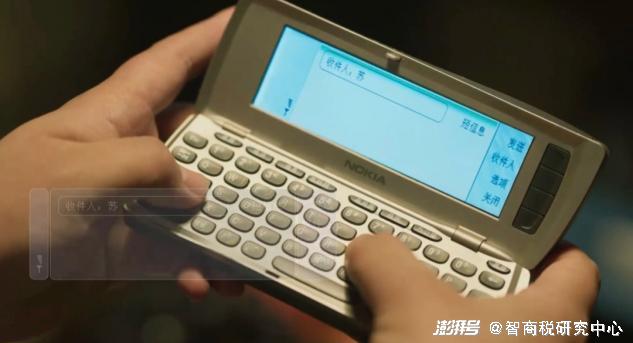
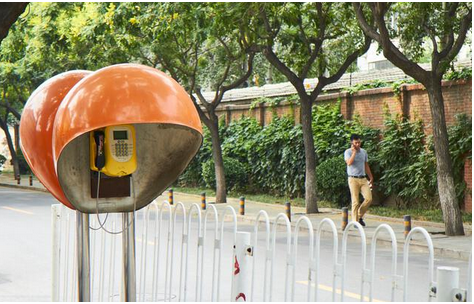 Picture from the Net, not featured in the drama : a China Unicom public phone booth in Beijing.
Picture from the Net, not featured in the drama : a China Unicom public phone booth in Beijing.

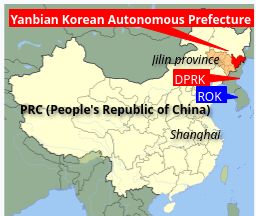
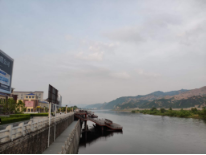
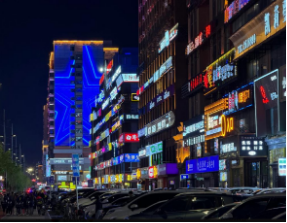
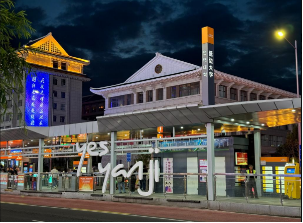
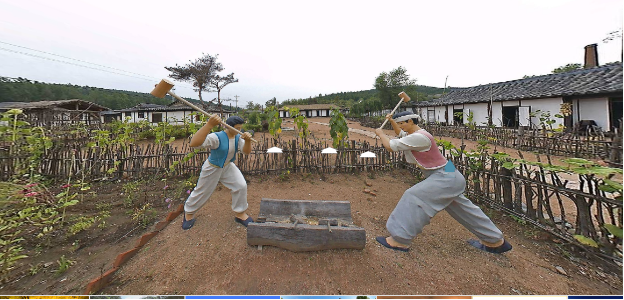
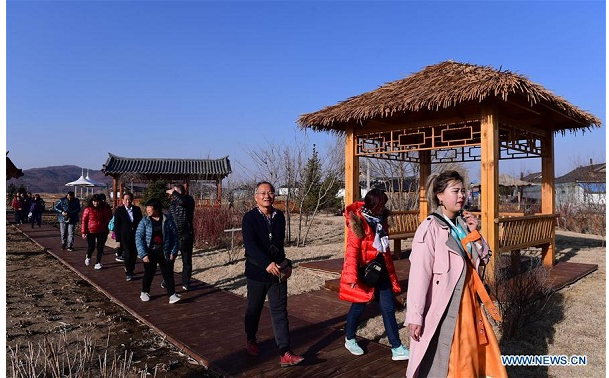
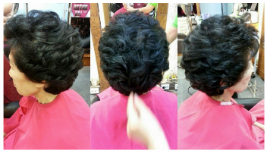
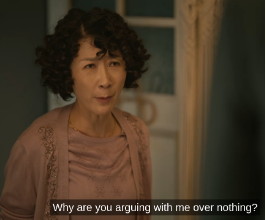 Huang Yimei's Cháoxiǎnzú mother in law (played by
Huang Yimei's Cháoxiǎnzú mother in law (played by 
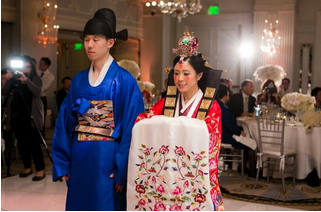
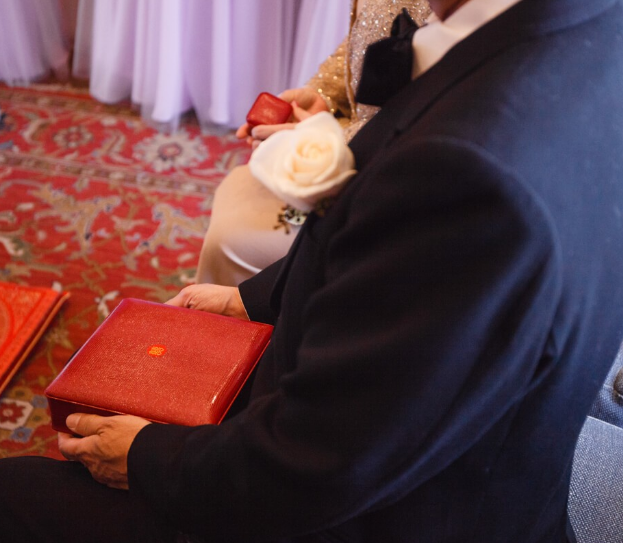
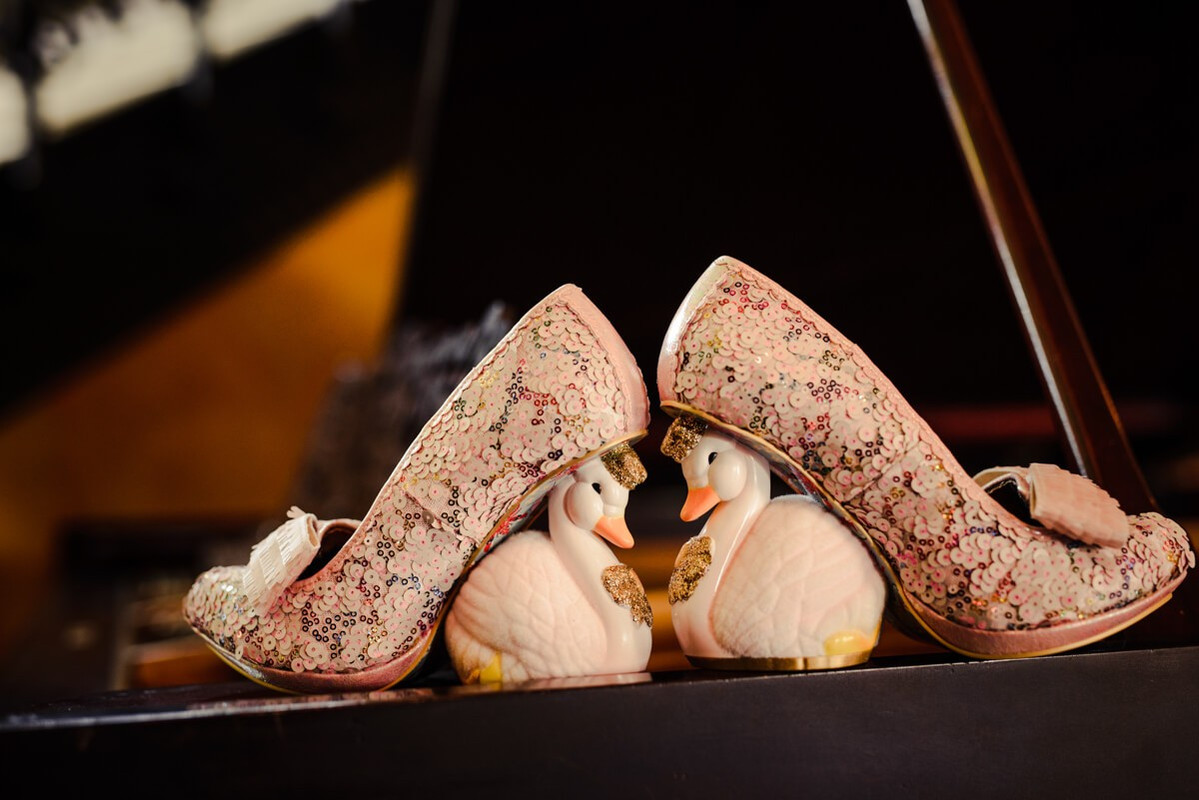
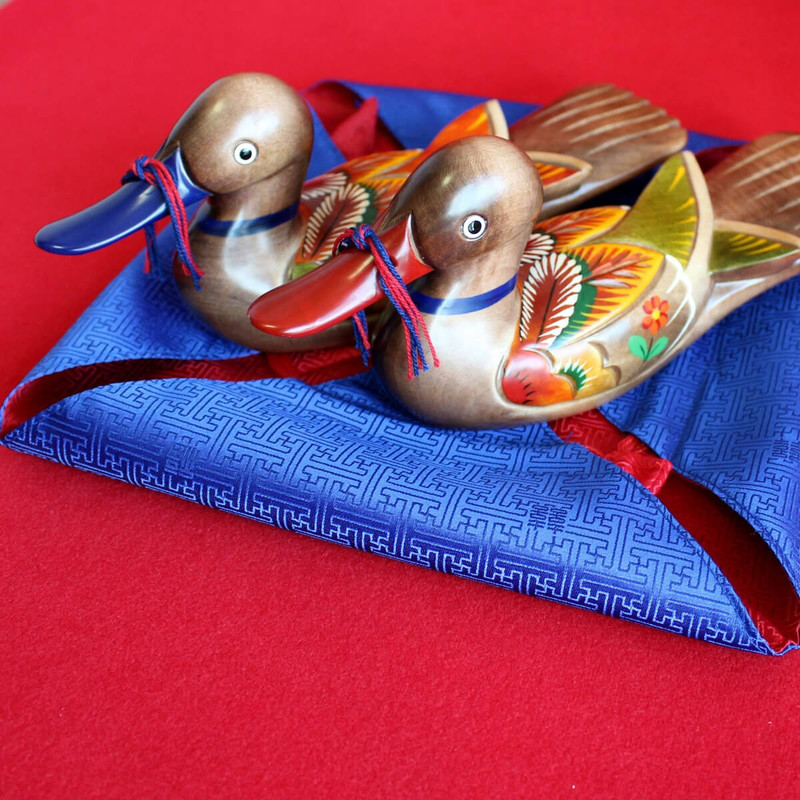
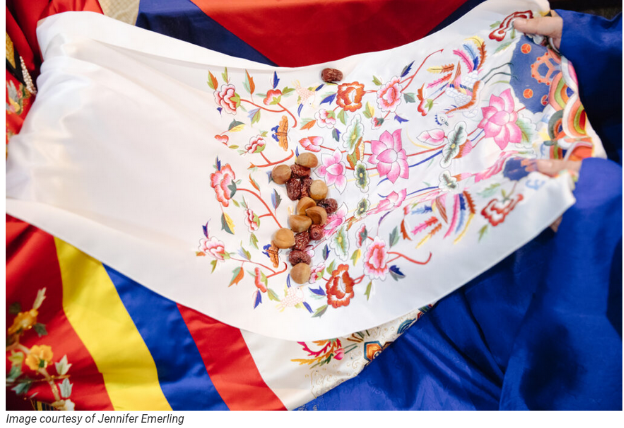
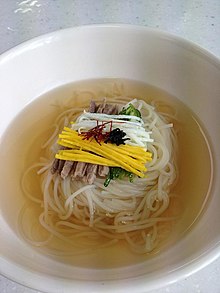
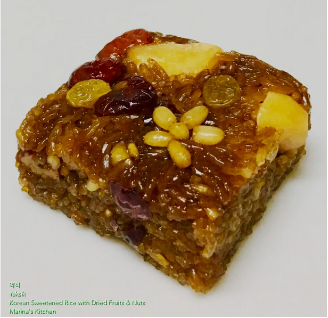
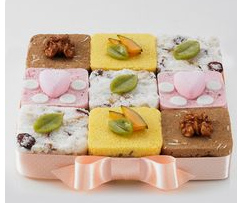
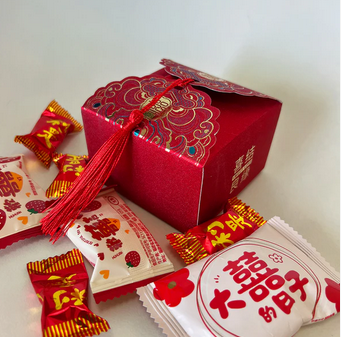
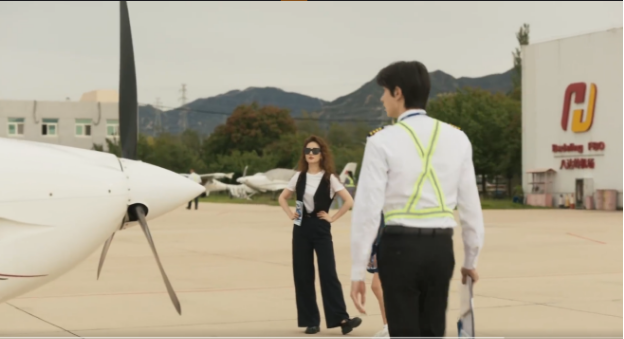




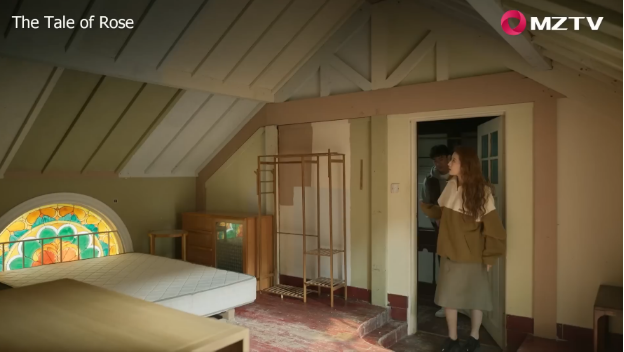
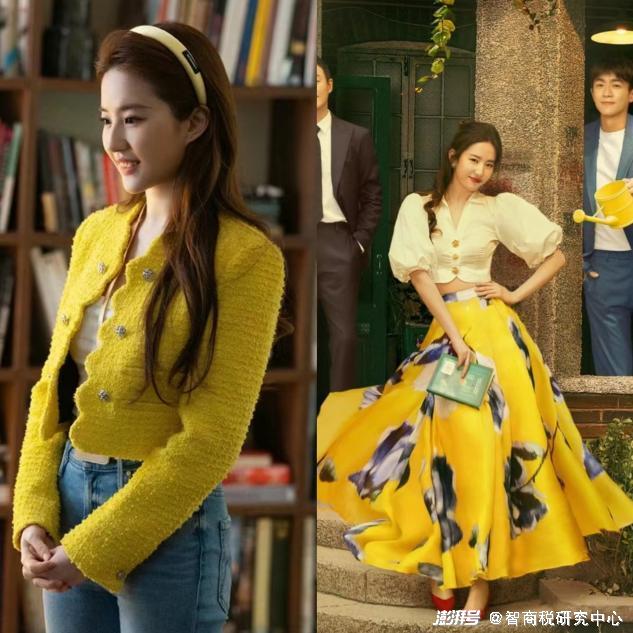


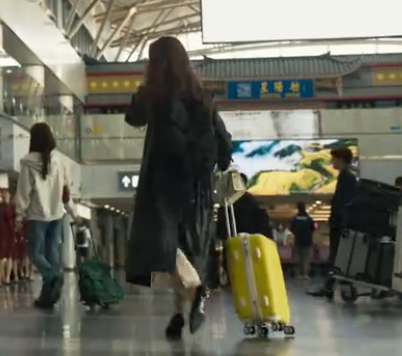
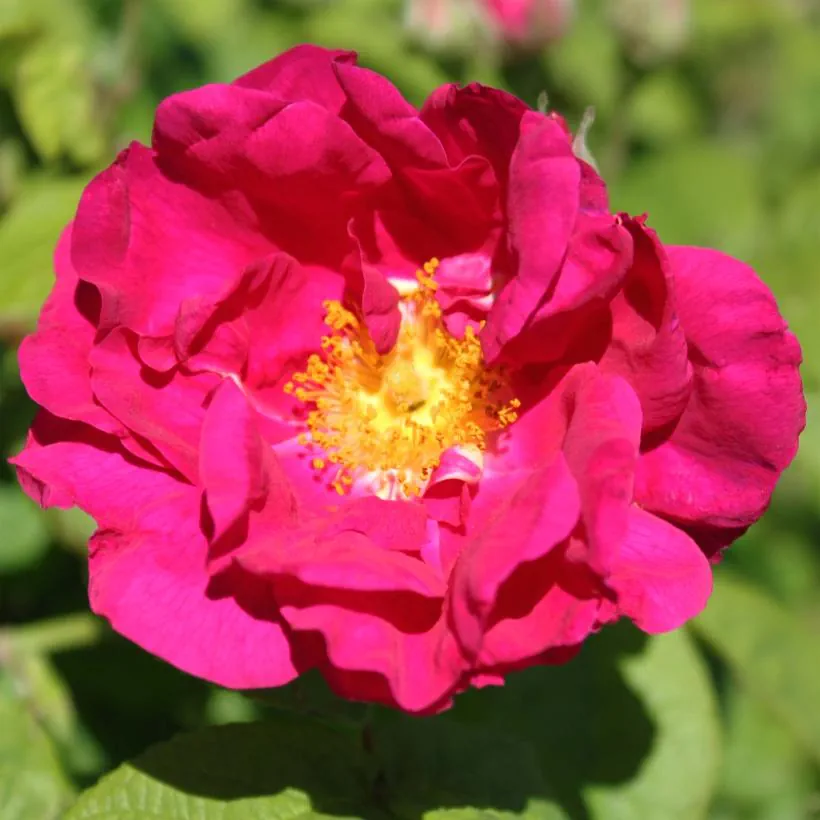
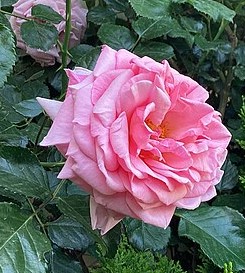
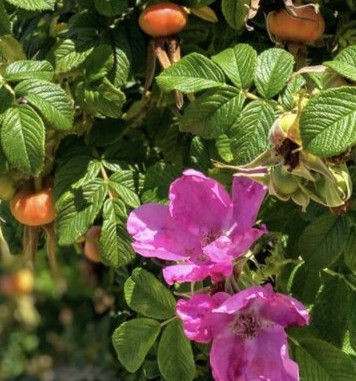
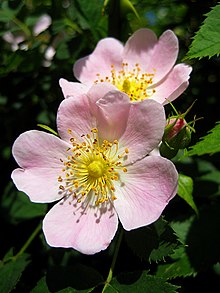
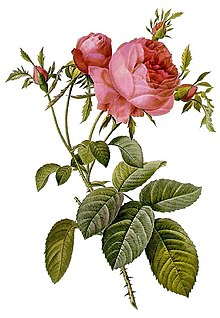



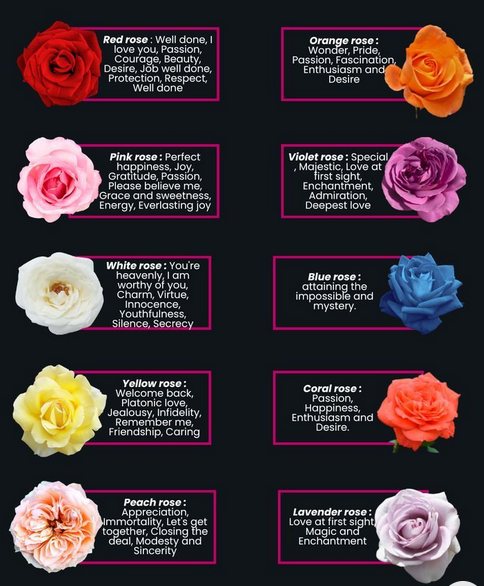
 (ep14) After breaking off, Meigui still was plagued by hallucination of him popping up at unexpected places, awkward times. Like when she visited the art exhibition in Shanghai with young Fang Xiewen, for whom it was first time looking at art.
(ep14) After breaking off, Meigui still was plagued by hallucination of him popping up at unexpected places, awkward times. Like when she visited the art exhibition in Shanghai with young Fang Xiewen, for whom it was first time looking at art.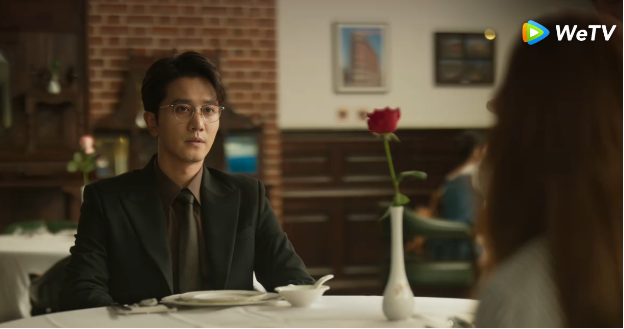
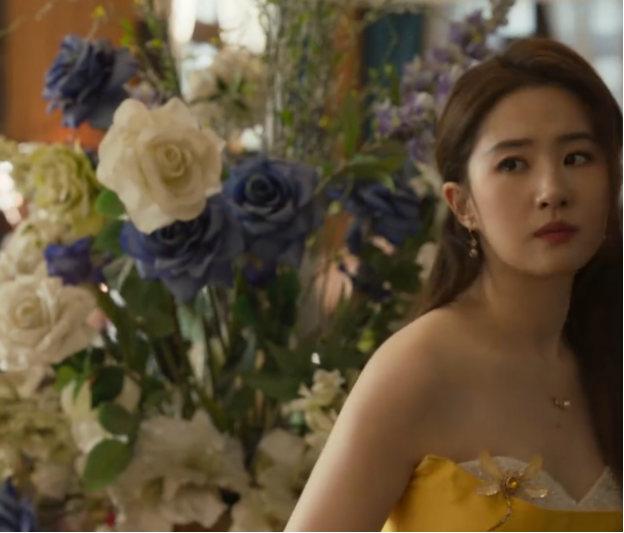 (ep17) White roses for new love, blue roses for the unattainable. (At the last social meet that Mrs Jiang, Tina, asked her to attend in Shanghai on the day of Fang's birthday).
(ep17) White roses for new love, blue roses for the unattainable. (At the last social meet that Mrs Jiang, Tina, asked her to attend in Shanghai on the day of Fang's birthday).
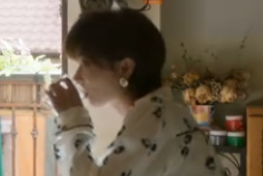
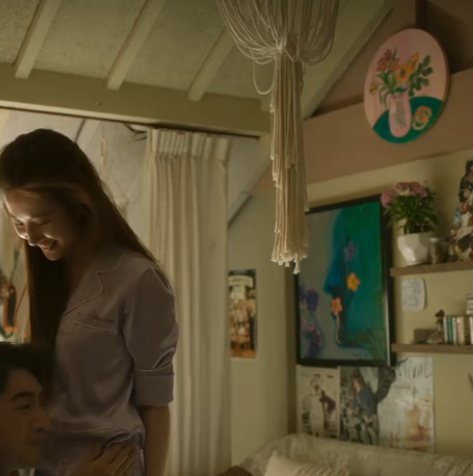 (ep21) When she announced her pregnancy, a small pot of pink roses had replaced the green dracaena plant on a shelf beside the paintings on the wall.
(ep21) When she announced her pregnancy, a small pot of pink roses had replaced the green dracaena plant on a shelf beside the paintings on the wall.
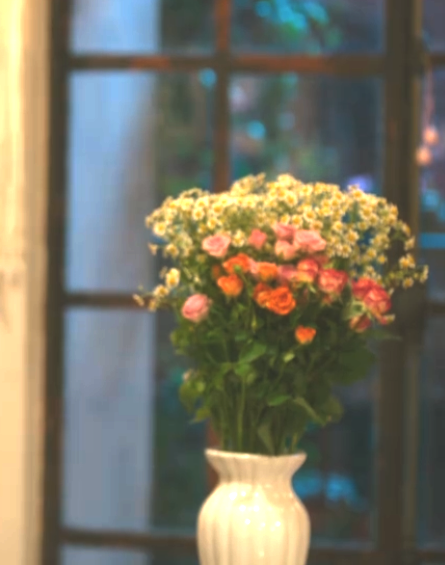 (ep.23) On a sunny day when she had fled her mother-in-law's hawk-eyed surveillance, Meigui purchased a nice bouquet of flowers, but met criticism by both Fang's mother and Fang, who asked for her money to help pay the deposit on the apartment he had booked.
(ep.23) On a sunny day when she had fled her mother-in-law's hawk-eyed surveillance, Meigui purchased a nice bouquet of flowers, but met criticism by both Fang's mother and Fang, who asked for her money to help pay the deposit on the apartment he had booked.


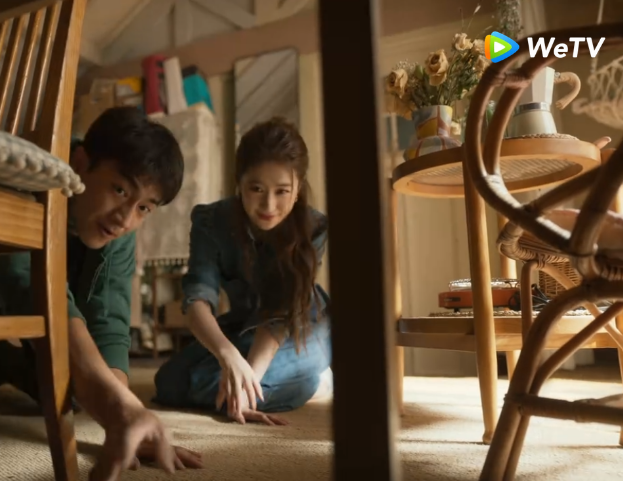


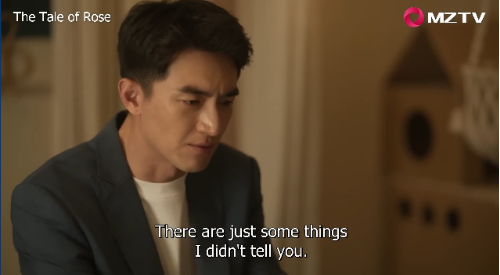

 He wanted to protect her at all costs, and his protective and patriarchal views also extended to valued friends : he resigned so his young protégé Zhou would not be sacked when he needed income to treat his sick mother. That kindness won him the heart of HYM who was the first to talk about marriage. Zhou also became later his most trusted sidekick together with Lin Hao (his friend and dormmate from Fudan) in his upstart, growing to become a major company. That was the dream that he had disclosed to Meigui when she coaxed him out of despair from being jobless. Meigui even invested time and money to get him started. He was intent on not letting her down, and build a happy home with her.
He wanted to protect her at all costs, and his protective and patriarchal views also extended to valued friends : he resigned so his young protégé Zhou would not be sacked when he needed income to treat his sick mother. That kindness won him the heart of HYM who was the first to talk about marriage. Zhou also became later his most trusted sidekick together with Lin Hao (his friend and dormmate from Fudan) in his upstart, growing to become a major company. That was the dream that he had disclosed to Meigui when she coaxed him out of despair from being jobless. Meigui even invested time and money to get him started. He was intent on not letting her down, and build a happy home with her. 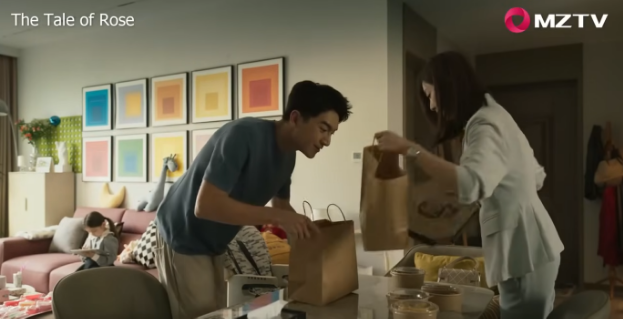
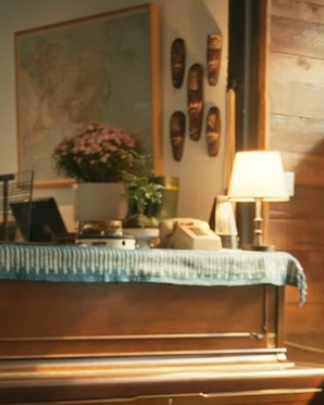 (Ep.33) There were not many plants in Fu Jiaming's bachelor and composer's den ; a pot of pink flowers (
(Ep.33) There were not many plants in Fu Jiaming's bachelor and composer's den ; a pot of pink flowers ( (ep38) A single yellow rose on the counter of Fang Xiaowen's new Beijing apartment : he never would give up hope, despite Meigui told him the thread had been cut between them and she would grow new ones, which had nothing to do with him.
(ep38) A single yellow rose on the counter of Fang Xiaowen's new Beijing apartment : he never would give up hope, despite Meigui told him the thread had been cut between them and she would grow new ones, which had nothing to do with him. (Ep.35) Dancing her grief became reality, in the hidden mirrored corridor of the Man Man art gallery...
(Ep.35) Dancing her grief became reality, in the hidden mirrored corridor of the Man Man art gallery...  (ep.38) The new, big apartment in Beijing
(ep.38) The new, big apartment in Beijing (ep38) Taichu showed to her dad that Meigui was learning to fly!
(ep38) Taichu showed to her dad that Meigui was learning to fly!
